AURORA, BRING







At Children’s Hospital Colorado, every child is treated with a personalized care plan just for them. Here, we offer everything you’d expect from a pediatric surgery center — and so much more.
Multidisciplinary teams
Our team of board-certified pediatric anesthesiologists and surgeons know how to help kids heal before, during and after procedures.
Fast, minimally invasive procedures
Using advanced pediatric techniques, most of our surgeries take less than an hour, so kids can get back to being kids sooner.
Our team of child life specialists, including a renowned medical dog program, keeps kids at ease throughout their stay.
We perform thousands of operations each month and have the best pediatric surgical success rates in the region.
Clinics and programs in South Denver
• Dermatology Ear, Nose and Throat
• Ophthalmology
• Gastroenterology
• Orthopedics
• Pediatric and Adolescent Gynecology

• Pediatric Surgery
Pediatric Plastic and Reconstructive Surgery
• Urology


And you thought it couldn’t get any worse.
At least I did. And millions of people like me probably are to blame for jinxing all of American Democracy by telling ourselves and each other, “this can’t get any (crazier) (weirder) (sicker) (more bizarre) (more dangerous.”
Donald Trump keeps lying about Hurricane Helene victims being victimized by corrupt FEMA folks. Rep. Marjorie Taylor Greene keeps lying about the Democratic government aiming Helene at Republican voters so Democrats can win the election.
Really.
Aurora, too, has been waist deep in “make it stop” ever since Councilmember Danielle Jurinsky went on a Fox News-powered tear trying to persuade people that Aurora apartments are exploding with Venezuelan gangs, and that without the “right vote” on Election Day, the “wrong” immigration policy will have us swimming in immigrants in a matter of weeks.
She knows she’s dead right because she’s in the stable genius company of anti-immigrant allies like Rep. Lauren Boebert and Trump. Fox News personality Laura Ingraham thanked Jurinsky for coming on and confirming the truth Fox News dutifully dispenses 24/7.
Jurinsky continues to double down on doubters like Gov. Jared Polis, who said the tsunami of Tren de Aragua gangsters she said are pouring down northwest Aurora streets are figments of her imagination.
Imagine this, she rebutted on social media last week. A “Democrat” she knows or follows on a so-
cial media channel told someone, possibly her, that Venezuelan immigrants, only here a short time, are being steamrolled through citizenship class here in the metro area, so the dreaded foreigner “CAN VOTE!” Presumably for a Democrat.
Wow. Just freaking wow.
These immigrants, like all others, can’t even get work permits, even though they’re due them as political refugees, not “illegal immigrants.” The U.S. immigration bureaucracy is so behind and so broken, these immigrants haven’t a prayer of getting anywhere near a Green Card application.
Citizenship? In weeks or months? This sounds like the title track of “Jurinsky — The Musical!”
Maestro, can I have a D Flat?
“In just sev-en-ty days, I can make you a sca-aaa-aaa-aaaaaam!”
My deepest apologies to Tim Curry and Richard O’Brien for such a cheap yet effective riff.
But really. Think about it. Why, in a Colorado place like Aurora and Denver, where there are already so many Democratic voters that there are virtually no Republicans holding any state or local public offices anymore, except a few on the Aurora City Council, would anyone kill themselves to push back against the entire weight of the Universe, to turn a handful of Venezuelan immigrants into citizens, for a few more Democratic votes?
The scheme sounds an awful lot like some third-rate Russian AI service, Chat CCCP, after commanding it to “create a demonizing scenario about Venezuelans in Aurora that will make the Republican heads explode.”
Jurinsky’s not alone in eliciting the “wait, what” out of most of Colorado every time she talks into her X account.
Heidi Ganahl, who ran for governor as a Republican in 2022 against Jared Polis, and got seriously whooped while her candidacy drowned in a sea of conspiracy theories, just can’t get over it.
She was peeved after limping to the election finish line, dragging ludicrous “furrygate” conspiracies. She had tried to persuade the state that JeffCo schools was swimming in child-cat creatures and the school district let them poo in cat-litter-boxes to appease them. The media and the public dismissed her as the weird person she proved herself to be. So she’s started her own online “journalism” channel, that offers her news that no one else seems to care to listen to anymore.
About two weeks ago, she published her exclusive two-year investigation into — are you ready for this — “election irregularities” in — wait for it: Douglas County. Yup. That Douglas County. The Douglas County south of here that would kill for a Gov. DeSantis and has more Republicans than deciduous trees.
Ganahl’s “investigation” revealed that some voting machines may have wifi cards in them. Yup.
And she reports that the USPS, that bastion of clarity and precision, may not have kept track of all the ballots. The numbers don’t match, something. And, brace yourself, some of the cameras pointed at voter drop boxes are NOT high-resolution.
There you have it.
When her own report went nowhere, she called a press confer-
ence at the Capitol. About a week later, Ganahl began accusing media like the Denver Post, 9News, CPR and others of hiding her investigation from the public.
Journalists at the Denver Post and 9News saw the social media accusation, and let the public know, they never sent anyone to her show.
Ganahl swears she saw someone with a Denver Post tag on a bag.
Maybe a Venezuelan who picked it up at a Colfax Arc?
Undaunted, Ganahl has taken to X with a vengeance, telling anyone who will listen to her diatribe X-vid, the sordid details of voter boxes without high-resolution cameras blurring out democracy.
This, just days after Colorado’s most infamous election denier and disputer, Tina Peters, was sentenced to nine years in prison for using her public position to continuously undermine trust in Colorado’s provably solid electoral process.
“It’s the position she held that has provided her with the pulpit from which she can preach these lies,” Mesa County Judge Matthew Barrett said when sentencing Peters. “Every effort to undermine the integrity of our elections and public’s trust in our institutions has been made by you.”
That, from a judge in a place in Colorado where Republicans have long ruled, and still do.
It kind of gives you hope, when, lately, there’s little cause for that.
Follow @EditorDavePerry on BlueSky, Threads, Mastodon, Twitter and Facebook or reach him at 303-750-7555 or dperry@SentinelColorado.com







BY CASSANDRA BALLARD, Sentinel Staff Writer
Aurora officials have notified owners of a now-notorious apartment complex that it will file legal action in an effort to close down the complex primarily because of unchecked crime at The Edge at Lowry.
The complex at 1218 Dallas St. was the site of an August home-security video depicting armed men in an apartment hallway that went viral and became the focus of heated controversy about Venezuelan immigrants and gang members.
Apartment complex owner CBZ Management has become the nexus of the controversy as some of its apartment complexes in Aurora have become the focus of conflicting claims about gang members, immigrants and property mismanagement.
Officials from CBZ Management did not return phone calls from the Sentinel.
Aurora closed another CBZ apartment complex earlier this summer, creating fear among other tenants of CBZ properties that they, too, will be evicted as cold weather approaches. The apartments are filled primarily with financially struggling tenants, many of them immigrants.
Controversies in the area have created a firestorm across the nation, culminating with presidential candidate Donald Trump persisting in false claims that all of Aurora has been taken over by Venezuelan Tren de Aragua gangs.
Although the Sept. 26 letter said the city is prepared to file in court if the company does not act, it would still be “several weeks” before the building would be forced to close, according to Aurora Deputy Director of Communications Ryan Luby.
“Our primary focus is getting these delinquent property owners to take care of their properties and their tenants,” Luby said in an email.
The letter states that the city has determined it will file a criminal nuisance action against CBZ Management by Oct. 6 for the six buildings on Dallas Street making up The Edge at Lowry complex, if the company does
not act.
The action would include the building where the notorious viral video was taken Aug. 18. Building owners and Aurora City Councilmember Danielle Jurinsky have claimed that the video, depicting six men with guns, knocking on an apartment door, and walking in, and another video depicting two men kicking in an apartment door somewhere in the complex, is proof that the complex was “taken over” by Venezuelan gangs. A man outside the apartment complex was fatally shot minutes after the armed men were seen in the security footage, police said.
Aurora police Tuesday announced they have identified all the men in the Aug. 18 video and are in the process of issuing warrants and making arrests. Police said that, to date, they are unaware of any evidence linking any of the men in the video to Venezuelan gangs, or any “organized crime.”
Aurora officials in the letter point to repeated crime reports in the Edge and lack of response to security and other issues by owners of the complex as the reason for a nuisance procedure.
Mayor Mike Coffman has referred publicly to CBZ as “slumlords.”
It was the same procedure used to shut down Aspen Grove apartments this summer after the city and residents reported unlivable conditions that the owner failed to resolve, in that case after more than two years of citations.
City officials have repeatedly said they have offered to assist and work with CBZ to rectify problems such as the lack of trash removal, police security, lack of water and a long list of public health concerns at this complex and others owned by CBZ.
Aurora city and police officials say they have focused on The Edge since controversy erupted in August.
On Sept. 20, the City of Aurora sent CBZ Management a “Specified Crime Property Determination Notice” for the Edge. Six days later, the Aurora City Attorney’s office sent CBZ Management a Criminal Nuisance Action including all six buildings in the complex.
The property owners are given 10 days be-
fore the city could file any criminal nuisance action to the Aurora Municipal Court. If filed, the city will “seek” a closure, according to the letter.
Since an updated letter was sent on Sept. 26, the property owners have until Oct. 6, city officials said Tuesday.
“The City will be prepared to file the necessary pleadings to commence the criminal nuisance action against these six properties in the Aurora Municipal Court the week of October 14, 2024,” the letter states.
The city’s letter requests that CBZ Management manage its properties or hire a qualified property management company for the six properties along Dallas Street before Oct. 14. In that case, the city will be willing to discuss the delay in filing, according to the letter.
The city has offered to provide temporary police presence at the property, but the offer was not accepted, city officials said previously.
“To be clear, this situation is different from the circumstances that closed one of your clients’ other properties located at 1568 Nome St, Aurora,” the letter states.
Aspen Grove apartment complex at Nome Street is the complex Aurora forced to close Aug. 13 due to negligence. Officials and legal representatives from CBZ Management have repeatedly insisted that that complex, too, was “overrun” by Venezuelan gang members, preventing the company from managing the apartment complex. Aurora police and city officials have repeatedly disputed the claim, saying there appeared to have been gang members on site, but that the problems were caused by years of neglect and mismanagement.
Unlike the Nome Street apartments, the six apartments on Dallas Street are being cited primarily for criminal activity going back about a year.
“Criminal activity on a property is a public nuisance under the Aurora Municipal Code,” stated in the Specified Crime Property Determination notice sent by the Aurora Police Department on Sept. 20. “Property owners are expected to be vigilant in preventing or deterring crime on or in their property and will be held responsible for the use of their property by tenants, guests and occupants.”
Cited Aurora police reports from The Edge at Lowry building at 1208 Dallas St.:
10/22/2023 Aggravated Assault Blunt Weapon
3/24/2024 Disturbance/Noise
4/29/2024 Trespassing
5/6/2024 Fugitive Arrest
5/8/2024 Trespassing
5/12/2024 Shots Fired
7/21/2024 Disturbance/Noise
8/3/2024 Aggravated Assault Gun
8/18/2024 Weapon Offense
8/19/2024 Homicide
Cited Aurora police reports from other buildings at The Edge at Lowry complex:
5/18/2024 1238 Dallas St. Robbery Carjacking
5/18/2024 1258 Dallas St. Home invasion
5/18/2024 1238 Dallas St. Trespassing 5/25/2024 1258 Dallas St. Threats/Damage Property/Intimidation
7/16/2024 1218 Dallas St. Burglary/Trespass
8/3/2024 208 Dallas St. Aggravated Assault Gun
8/10/2024 1268 Dallas St. Aggravated Assault Gun
8/13/2024 1258 Dallas St. Home Invasion/Robbery
8/18/2024 1218 Dallas St. Burglary/Menacing
Aurora police investigate allegations of rampant gangs at The Edge at Lowry Apartments at East 12th Avenue and Dallas Street in Aurora. Some Aurora City Council members have gone on national and local TV saying that the complex is dangerous because its overrun by Venezuelan gangs. Residents, police and city staff say it’s untrue, and that a “slumlord” has made it nearly unlivable. SCREEN GRABS FROM APD VIDEO
Judge: Risk from fluoride in drinking water merits EPA review — Aurora levels could warrant action
A federal judge has ordered the U.S. Environmental Protection Agency to further regulate fluoride in drinking water because high levels could pose a risk to the intellectual development of children.
U.S. District Judge Edward Chen cautioned that it’s not certain that the amount of fluoride typically added to water is causing lower IQ in kids, but he concluded that mounting research points to an unreasonable risk that it could be. He ordered the EPA to take steps to lower that risk, but didn’t say what those measures should be.
Since 2015, federal health officials have recommended a fluoridation level of 0.7 milligrams per liter of water. For five decades before that, the recommended upper range was 1.2. The World Health Organization has set a safe limit for fluoride in drinking water of 1.5.
The City of Aurora does not add fluoride to water because most Colorado mountain run-off water is naturally fluoridated from mineral content. City water officials say they’re following the legal and regulatory changes closely.
“Our most recent water quality monitoring for fluoride between Sept. 1, 2023, and Sept. 25, 2024, shows results between 1.1 ppm and 0.576 ppm,” of fluoride in drinking water provide to Aurora customers, Aurora water spokesperson Shonnie Cline said in a statement to the Sentinel.
The current regulated limit for fluoride is 4 p.p.m.
But those are the previous limits set primarily for bone and teeth.
Aurora’s next steps will be dictated by what the courts and federal officials do.
“Aurora Water will be monitoring any next steps that the EPA takes with respect to potentially reducing the MCL for fluoride,” Cline said. “The health and wellbeing of the people who live and work in Aurora are our primary focus. We will take the necessary actions to ensure we continue to provide drinking water that meets all federal and state water quality standards.”
If the city were to have to further reduce the naturally occurring fluoride levels in Aurora drinking water, the process would be arduous and probably costly.
“Due to the chemical nature of fluoride, it can be challenging to remove from water, as conventional treatment does not significantly reduce fluoride concentrations,” Cline said. Options to remove fluoride from the water would include “ion exchange and reverse osmosis, both of which involve substantial construction and operational costs.”
City water officials did not provide any cost estimates for compliance with lower levels.
“If the EPA implements a standard for fluoride lower than what is found in our source water, Aurora Water will evaluate the effectiveness and costs of various treatment options to determine the most appropriate solution,” Cline said.
This is the first time a federal judge has made a determination about the neurodevelopmental risks to children of the recommended U.S. water fluoride level, said Ashley Malin, a Uni-
versity of Florida researcher who has studied the effect of higher fluoride levels in pregnant women.
She called it “the most historic ruling in the U.S. fluoridation debate that we’ve ever seen.”
The judge’s ruling is another striking dissent to a practice that has been hailed as one of the greatest public health achievements of the last century. Fluoride strengthens teeth and reduces cavities by replacing minerals lost during normal wear and tear, according to the U.S. Centers for Disease Control and Prevention.
Last month, a federal agency determined “with moderate confidence” that there is a link between higher levels of fluoride exposure and lower IQ in kids. The National Toxicology Program based its conclusion on studies involving fluoride levels at about twice the recommended limit for drinking water.
The EPA — a defendant in the lawsuit — argued that it wasn’t clear what impact fluoride exposure might have at lower levels. But the agency is required to make sure there is a margin between the hazard level and exposure level. And “if there is an insufficient margin, then the chemical poses a risk,” Chen wrote in his 80-page ruling last month.
“Simply put, the risk to health at exposure levels in United States drinking water is sufficiently high to trigger regulatory response by the EPA” under federal law, he wrote.
An EPA spokesperson, Jeff Landis, said the agency was reviewing the decision but offered no further comment.
In 1950, federal officials endorsed water fluoridation to prevent tooth decay, and they continued to promote it even after fluoride toothpaste brands hit the market several years later.
Fluoride can come from a number of sources, but drinking water is the main source for Americans, researchers say. Nearly two-thirds of the U.S. population currently gets fluoridated drinking water, according to CDC data.
Separately, the EPA has a longstanding requirement that water systems cannot have more than 4 milligrams of fluoride per liter of water. That standard is designed to prevent skeletal fluorosis, a potentially crippling disorder which causes weaker bones, stiffness and pain.
But in the last two decades, studies have suggested a different problem: a link between fluoride and brain development. Researchers wondered about the impact on developing fetuses and very young children who might ingest water with baby formula. Studies in animals showed fluoride could impact neurochemistry cell function in brain regions responsible for learning, memory, executive function and behavior.
The court case, argued in U.S. District Court in San Francisco, started in 2017. The lead plaintiff was a notfor-profit advocacy environmental advocacy organization named Food & Water Watch. Chen paused the proceedings in 2020 to await the results of the National Toxicology Program report, but he heard lawyers’ arguments about the case earlier this year.
“In our view, the only effective way to eliminate the risk from adding fluoride chemicals to water is to stop adding them,” said Michael Connett, the plaintiffs’ lead attorney, in an email Thursday.
The Associated Press Health and Science Department receives support from the Howard Hughes Medical Institute’s Science and Educational Media Group. The AP is solely responsible
for all content.
— MIKE STOBBE AP Medical Write and SENTINEL STAFF WRITERS
Unattended patio grill fire decimates Aurora house
A patio charcoal grill left briefly unattended is to blame for a house fire Oct. 5 that consumed the deck, a tree and the entire front portion of a duplex in the Expo Park neighborhood.
No injuries were reported from the fire, but the house is now uninhabitable and the family has been forced out.
Firefighters were called to the house at about 5:15 p.m. by residents, who later said they’d been grilling food outside on a deck and briefly went inside.
“The fence in front of the deck where the grill was sitting erupted into flames,” Aurora Fire and Rescue spokesperson Dawn Small said in a statement. “The fire quickly spread to a large tree next to the fence, the deck and to the residence.”
The occupant and two small children got out of the house without injury.
The American Red Cross has offered the family assistance.
Small cautioned homeowners about the dangers of outside cooking grills places in precarious outdoor locations.
“Grills placed too close to anything that can burn is a fire hazard,” Small said.
National fire protection officials offer this advice:
• For propane grills, check the gas tank for leaks before use.
• Keep your grill clean by removing grease or fat buildup from the grills and in trays below the grill.
• Place the grill well away from the home, deck railings, and out from under eaves and overhanging branches.
• Always make sure your gas grill lid is open before lighting it.
• Keep children and pets at least three feet away from the grilling area.
• If you use starter fluid when charcoal grilling, only use charcoal starter fluid. Never add charcoal fluid or any other flammable liquids to the fire. When you have or are finished grilling, let the coals cool completely before disposing in a metal container.
• Never leave your grill unattended when in use.
— Sentinel Staff
Montbello area students help create a tip line app to curb youth violence
A new app for young people in three northeast Denver neighborhoods aims to reduce violence by connecting youth to the help they need before things reach a breaking point.
Launched in July, “The Power of One” app is a bit like the statewide tip line Safe2Tell, but with two key differences. It addresses a broader array of problems than threats, violence, or self-harm and aims to minimize police involvement unless absolutely necessary.
Youth can use the free Power of One app or accompanying hotline to submit anonymous tips or request help with issues such as finding a counselor, preventing home utilities from being shut off, or heading off an imminent fight at school. Four trained peer mediators will field many of the
submissions, but true emergencies will be referred to law enforcement. The program is aimed at students in Montbello, Green Valley Ranch, and Park Hill, but submissions from other neighborhoods will also be addressed.
Although the app has received only one submission so far — a student request for volunteer opportunities — leaders of the effort hope it will eventually expand citywide and help derail youth violence by providing holistic help to young people.
“When youth are struggling, whatever those struggles can be, if they’re not addressed, they can kind of cascade … into eventual involvement in violence,” said Dave Bechhoefer, project director for the Youth Violence Prevention Center-Denver, which spearheaded the app.
Arrests for violent crime, homicide, and aggravated assault in the neighborhoods targeted by the app exceed rates in Denver and the nation, according to the data from the University of Colorado Boulder, where the center is housed.
Kaliah Yizar, one of about a dozen youth advisers who helped shape The Power of One app, said one of the ways the app can help is by connecting youth to positive outlets.
“What we’ve seen is that when youth are given opportunities … such as playing sports, such as joining clubs, getting involved in school, those students are much less likely to get involved in youth violence,” she said.
The app, which is monitored around the clock, is also meant to interrupt violence that may be brewing.
Yizar, now a junior at Howard University in Washington, D.C., said she would have appreciated the app when she was in high school at Martin Luther King Jr. Early College in the Green Valley Ranch neighborhood.
It would have helped “if I knew about something and I was afraid of going to someone at school, if I was afraid of calling the police and being labeled a snitch,” she said.
When Yizar’s aunt was principal at her school, students often let her aunt know if, for example, a classmate posted a photo of a gun on Snapchat or was planning a fight.
The Power of One app “is great for youth who don’t have those connections in school and still want to let people know about what they know, but do it in a way that’s anonymous and safe to them,” she said.
The app began taking shape in 2022 with help from a $6 million federal grant focused on finding innovative ways to reduce youth violence. Bechhoefer said the basic idea was to connect youth in the target neighborhoods to community resources, but the project’s youth advisers homed in on the best way to do that.
“When we talked about the strategy with our youth council, the first thing they said was, ‘Well, you need an app,’” he said.
The Power of One uses the same software and architecture as the 20-year-old Safe2Tell service, but includes other features, such as links to local organizations and event calendars. Several suggestions from the youth council were incorporated into the app, including the phrase “make a connection” instead of “make a tip,” which Yizar said can have negative connotations to teens.
One of the app’s main selling points is that it’s a community-based service, she said.
“Down the road the youth would
like to link to job opportunities, internships, anything that can also support youth,” Bechhoefer said.
Right now, the biggest challenge for Bechhoefer, Yizar, and other champions of the effort is getting the word out to local teens. The app has been downloaded 163 times, has received one direct submission, and a couple referrals from other reporting services. In contrast, Safe2Tell received more than 28,000 tips during the 2023-24 school year.
Yizar said she and other students involved in the project tabled at block parties over the summer to tell youth and parents about the app. Some downloaded it on the spot. Although Yizar is now away at college, other teens are working to get the word out at their Denver schools.
The federal grant that funds the app project expires in 2026.
“We have basically two years to really show that this is an effective youth violence intervention,” Bechhoefer said.
— ANN SCHIMKE, Colorado Chalkbeat
Man shot in leg Oct. 5 during brawl in Aurora hotel parking lot, police say
An unidentified man was shot in the leg Oct. 5 during what police described as a “massive fight” in the parking lot of an East Colfax hotel in Aurora.
Police were called to the Holiday Inn hotel at 14200 E. Colfax Ave. at about 10:15 after reports of a shooting in the parking lot.
“Once on scene, they were met with a chaotic crowd of teenagers who had just been involved in a massive fight in the parking lot,” according to Aurora police spokesperson Agent Matt Longshore.
At some point during the melee, a man was shot in the leg, police said. “Officers applied a tourniquet and he was taken to the hospital with serious injuries,” Longshore said.
Three unidentified teenagers were also hurt during the donnybrook and were taken to hospitals for non-gunshot-related injuries.
“Officers and Investigators are still trying to determine what led up to the fight and subsequent shooting, who was involved and their exact involvement,” Longshore said.
Investigators are reviewing hotel security footage and interviewing witnesses.
No arrests have been made.
— Sentinel Staff
Man running across Colfax in Aurora struck by car, killed
A man running across East Colfax Avenue in northwest Aurora was struck by a car Oct. 5 and later died from his injuries, police said.
The unidentified man was not in a crosswalk when he darted across the roadway at Macon Street on East Colfax Avenue at about noon, police said.
“The driver remained on scene,” police said in a statement. “There is no indication that speed nor alcohol were contributing factors.”
The man was rushed to a nearby ›› See METRO,








ALL-AURORA MATCHUP WITH GRANDVIEW 7-0 TO EARN RETURN TRIP TO
Although it didn’t change the overall outcome, two No. 1 singles heavyweights squared off during the Class 5A boys tennis team state quarterfinal match between Regis Jesuit and Grandview Oct. 5.
The host Raiders — the top seed in the 16-team tournament — remained undefeated in dual matches on the season with a 7-0 victory over the eighth-seeded Wolves, though the sweep was anything but easy.
Coach Laura Jones’ Regis Jesuit team had already secured passage into the Oct. 15 semifinals (where it will face No. 5 Fossil Ridge), but the last match on the court was a showdown between Raiders’ sophomore Alec Rodriguez-Fields and Wolves’ junior Justin Son that lasted three outstanding sets.
BY COURTNEY OAKES Sports Editor
TOP: Regis Jesuit sophomore Alec Fields-Rodriguez reacts to winning a key point in the No. 1 singles match of the Class 5A boys tennis team state tournament quarterfinal on Oct. 5 at Regis Jesuit High School.
ABOVE CENTER: Regis Jesuit freshman Blake Wright defeated previously unbeaten Kaahan Wani of Grandivew at No, 2 singles as part of the Raiders’ sweep.
Son was the 5A individual state runner-up at No. 1 singles last season and Rodriguez-Fields finished second at No. 2 singles in the same tournament and they were both in fine form when they met as headliners of the team dual. Rodriguez-Fields (whose only two losses of the season came to Kent Denver star Nathan Gold) came away victorious, as he sandwiched 6-1 set victories around a 6-3 Son victory in the second set.
It was the cherry on top for the Raiders, who also swept No. 16 Northfield in the first round.
“It was fun to watch, there were some good matches out here and to come out on top in every single one of them means a lot,” Jones said. “I feel like the kids are very up right now and playing some of the best tennis they’ve played all year and if we keep on the same trajectory, we could bring this thing home this year.”
In the team state tournament format, however, every match carries the same weight and Regis Jesuit was able to come away on top in all seven positions.
Rodriguez-Field’s victory completed a singles sweep, as Regis Jesuit freshmen twins Blake and Sebastian Wright won the battle with Grandview fresh-

men twins Kaahan and Krish Wani. Blake Wright downed previously unbeaten Kaahan Wani 6-2, 6-2, while Sebastian Wright eventually got past Krish Wani 6-2, 6-4.
Two doubles matches lingered late in the dual. Regis Jesuit’s No. 2 team of senior KC Eckenhausen and junior Adam Rydel dropped a second set tiebreak with Grandview’s team of senior Atharv Peroor and freshman Nathan McIsaac, but rolled to a 6-0 victory in the third set to gain the win.
The No. 1 doubles match pitted Regis Jesuit junior Clay Dickey and sophomore Vlad Sukhovetskyy against Grandview senior Blake Hardin and junior Carter Benton. All four players were in the singles lineups of their respective teams last season before they ended up in doubles this season. Sukhovetskyy (the 5A No. 3 singles state champion last season) and Dickey (who spent two seasons at No. 1 singles) topped Benton (a state qualifier at No. 3 singles last season) and Hardin (who played No. 2 singles previously) 6-2, 6-3.
First off the court was the Regis Jesuit No. 4 doubles team of seniors Aiden Prananta and Spencer Buege, who earned a 6-1, 6-1 victory over Grandview’s Corbin Thompson and Andres Salazar. That was followed by senior Carl Siegel and sophomore Edward Samuelson
with a 6-0, 6-1 victory over sophomore Kushal Ninganola and freshman Rithvik Ninganola of the Wolves. Regis Jesuit is the only team to win both of its first two team state dual matches by sweeps and it will play host to Fossil Ridge, which defeated No. 7 Fairview 5-2. On the other side of the bracket are No. 2 Cherry Creek and No. 3 Valor Christian, which both advanced via 6-1 wins. The same semifinals took place last season, as the Raiders and Bruins advanced to the final, which was won by Cherry Creek 4-1.
For the first time on both the Regis Jesuit and Grandview campuses, Class 5A boys tennis regional tournaments will be held. The Raiders have earned hosting honors multiple times in the past due to high league finishes, but have never had the seating capacity to host a tournament until this year with the opening of its new tennis center. The Wolves traditionally finish too low in the league standings to get hosting duties, but finished as the Centennial League runner-up this time to achieve the feat. Grandview welcomes Chatfield, Columbine, Fort Collins, Fountain-Fort Carson, Legend and Riverdale Ridge for the 5A Region 7 tournament, which will begin at 8:30 a.m. Oct. 9 and conclude the next day. Regis Jesuit’s Region 2 tournament is set to start at 9 a.m. Oct. 10 and will include another local program in Rangeview along with Broomfield, Centaurus, Highlands Ranch, Liberty and Ponderosa.
Meanwhile, Eaglecrest and Vista PEAK Prep will play in the Region 3 tournament that starts at 9 a.m. Oct. 9 at Valor Christian and Highlands Ranch high schools, Smoky Hill is at North Lake Tennis Park starting at 9 a.m. Oct. 10 for the Region 4 tournament and both Cherokee Trail and Overland compete in the Region 5 tournament that starts at 8 a.m. Oct. 9 at APEX Tennis Center. Those that advance through regionals head to the Denver Tennis Park for the 5A individual state tournament Oct. 17-19.
Right: Grandview senior Michael Rosman, left, looks down the fairway on Hole No.
1 at CommonGround G.C. during the opening round of the Class 5A boys golf state tournament on Oct. 7. Rosman shot 4-under-par 67 to tie for second after the first of two days.
Middle: Junior Dalton Sisneros ended the first day of the 5A boys golf state tournament in a tie for sixth place and helped the Cougars tie for fifth place going into the Oct. 8 final round.
Below: Coming into the 5A boys golf state tournament after he shot a 6-under-par 66 in regionals, Regis Jesuit senior Sam Walker shot 76 in the opening round.
PHOTOS BY COURTNEY
OAKES/AURORA SENTINEL

An outstanding season of boys golf across Aurora and around Colorado comes to a close with the Class 5A state tournament, which began Oct. 7 at CommonGround G.C.
Golfers from Aurora area programs earned 15 of the 84 available spots for the two day, season-ending tournament, where players who shot remarkably low scores and lit up many a course come together for a shot at grand prizes.
BOYS GOLF
just four strokes behind Regis Jesuit.
Rosman was the only Wolves’ player with previous state experience and the others got their first experience as part of a loaded field. Senior Andrew Sinar shot 79 — which put him in a time for 64th — while sophomore Dominki Fedotov and Sam Silver both shot 85 to tie for 83rd.
BY COURTNEY OAKES Sports Editor
Grandview senior Michael Rosman — owner of Aurora’s lowest score of the season, a 10-under-par 62 shot during Centennial League play at Aurora Hills G.C. — aims to finish his final season on top. His second lowest all-time score (64) came at a junior tournament at CommonGround and he showed his comfort with the course with an opening round of 4-under 67. That left Rosman — the Centennial League champion — in a tie for a second, just one off the lead, as he sought to better his career-high of 14th place from his junior season.
Next highest on the leaderboard among Aurora individuals on the opening day of the tournament was junior Dalton Sisneros of Cherokee Trail, who shot 69 to put himself in a tie for sixth place.
Sisneros is part of a Cougars team that returned completely intact from last season, when they finished in a tie for second place. Combined with fellow junior Brayden Forte (tied for 23rd after the first round with a 73) plus senior Christopher O’Donnell and sophomore Anthony Chen (who both shot 77 and were par tof a tie for 52nd), coach Ryan Stevens’ Cherokee Trail team lurked in position to strike on the final day. Next-highest in the team standings after the first round was Regis Jesuit, which held 12th place.
Individually, Smoky Hill sophomore Reece Nuwash had a share of the lead after he made the turn at 4-under-par, but trouble in the final stretch brought him in with a plus-3 74. Nuwash shared the 30th position in the individual standings with Eaglecrest junior Gregory White, who played in his third career state tournament. Nuwash’s junior teammate Hudson Roth carded an 84 to put himself in a tie for 80th after the initial 18 holes.
Depth on the rise around Aurora
Cherokee Trail, Grandview and Regis Jesuit all got four-player teams into the state tournament, but all three programs had multiple other players that could very well have been there also had more spots been available.

For final Class 5A state results, recap and more, visit sentinelcolorado. com/preps
Most striking was the situation with Regis Jesuit, which always boasts depth, but maybe more than ever before in Rogers’ estimation. With how well the foursome of Walker, Thornton, Lore and Doolittle played at the end of the season, there was no room for seniors Ben Sander and Owen Casey. Sander earned a medal in his only trip to the state tournament as a junior when he tied for sixth and consistently placed in the top 10 of many Continental League tournaments, but fell victim to the Raiders’ depth. So too did Casey, who also had a stroke average around 75.
Coach Craig Rogers’ all-senior lineup didn’t have any players shoot under par in the first round, with the top score coming from Ryland Doolittle, who tied for 37th with his 75. A stroke behind Doolittle came Sam Walker (who was the medalist in regional play) and Anthony Lore in a tie for 44th and Roland Thornton rounded out the mix with an 83 that tied him for 73rd.
Grandview — which qualified a four-player team for the state tournament for the first time in several seasons — ended the first day in 13th place,
“It’s heartbreaking it cost me a lot of sleep and stress,” Rogers said. “We do our best to be fair and give an equal shot at it. No matter how it turned out, a couple of great players were going to be left out. They handled it really well and I’m proud of their character and how they dealt with their disappointment.”
Grandview held a simulated 27-hole playoff to determine who would be in its four-player regional group and Silver bumped one of the players in front of him to get onto it. He went on to have the second-lowest score for the Wolves and helped them win a team playoff to early an automatic state team berth. Cherokee Trail’s depth also impressed Stevens in his first season as head of the program and should help the team replace O’Donnell, a four-time state qualifer.

When deciding your ballot, everyone’s future rides on successful schools
One of the first and critical roles of the state — and consistent failures — has been to adequately provide for public education.
Since the 1960s, the state has regularly shrugged or outright shirked that role, to the disservice of millions of students, and all its residents.
For decades, Colorado has lived toward the bottom of the list of states ranked for how much they fund schools on a per-pupil basis, truly a badge of shame.
The situation grew so dire that in 2000 voters took the extraordinary action of passing a constitutional amendment that forced the state to increase school funding each year at least by the rate of inflation.
Thwarting the will of voters, state legislators in 2010 undermined the spending mandate by creating “negative factors” imposed on the school finance formula, allowing lawmakers to spend money intended for public schools, elsewhere.
The move has effectively diverted hundreds of millions of dollars from public school funding, at a time when the need for increased resources grew as exponentially as state lawmakers withheld it.
For the past 20 years, schools in Aurora and across the state have increasingly become not just charged with delivering public education, but social services, health care and more.
Increasingly, public schools have had to fill in for families who must work more than ever to keep pace with the region’s exorbitant cost of living.
It doesn’t mean that schools aren’t the best place to provide mental health care for troubled students, or provide a place to get even simple medical treatment. And as the scourge of youth violence continues to escalate in the metro region, and across the country, it only makes sense that public schools become the nexus for preventive programs.
But as public schools become increasingly responsible for all kinds of children’s services, besides education, the state legislature must provide the money to make it all possible.
Some progress was made this year, in the regular and special legislative sessions. State lawmakers created a system to “fully fund” public schools, which actually works to ensure schools are funded more closely to what Amendment 23 detailed. During the special session, lawmakers and Gov. Jared Polis headed off state ballot questions that would have seriously undermined school funding.
But the problem hasn’t been resolved.
State budget officials say a peek into the fiscal future of the state is troubling, and built into the “full-funding” measures from earlier this year is an escape clause.
Meanwhile, the responsibilities for school districts across the state, and especially here in Aurora Public Schools and Cherry Creek Public Schools continue to expand.
Both school districts have taken on large numbers of migrant students and others who need a great deal of additional assistance to catch up to their peers.
While the state has boosted per-pupil spending for some of these students, it does not pay for what local schools need to provide.
And all kinds of students increasingly need physical and mental health services, aspects of their lives that directly affect their ability to learn.
This year, both school districts are asking voters to approve measures that would raise money to pay for a wide range of construction, repairs and investments in education projects, as well as provide funds for teacher salaries and a variety of instructional programs.
The Aurora Public Schools ballot questions both come without any tax increase.
The Cherry Creek schools questions, raising $9 million annually for operations and $950 million for construction funds, would cost the owner of a $500,000 home in the district an additional $15 a month in new property taxes.
Given the unsettled financial situation in the state, and the crucial need for resources in both of these large Aurora school districts, voters should look seriously at approving both questions.
These school districts, like so many others, have become responsible not just for teaching kids and preparing them for careers or college, but for helping them to steer clear from lives of addiction, depression and violence.
Never has so much depended on what’s deemed merely as “school funding.”


As homeschool advocates, we fear the so-called ‘school choice’ measure
On many large issues we disagree.
Carolyn, as part of Christian Home Educators of Colorado, values a Christian foundation for education. Ari is a secular homeschool dad. But we agree on the importance of Colorado parents having the freedom to guide the education of their children. We also agree that the so-called “school choice” ballot measure, Amendment 80 (originally Initiative 138), contrary to its stated purpose, poses a serious threat to the educational choices of families like ours.
In his recent op-ed, Aurora Councilmember Curtis Gardner claims that Amendment 80 will protect school choice, but he does not examine the language of the measure. The devil is in the details! Gardner also claims that “choice has been under attack at the State Legislature”—we assume he refers to efforts to restrict charter schools—but he doesn’t explain how Amendment 80 might help. In fact, it is more likely to undermine the autonomy of charter schools.
We urge people to read the actual language of this proposed state Constitutional amendment (on page 64 of the Blue Book). Part of the measure states, “All children have the right to equal opportunity to access a quality education.” That sounds great as an abstract goal. We all want a quality education for our children! The problem is that, when written into the state’s fundamental law, this creates a positive obligation for state government to guarantee that each child’s education is a “quality” one—as decided by politicians and bureaucrats. This threatens the authority of parents to decide what constitutes for their own children a quality education.
In short, Amendment 80 practically begs state government to more harshly regulate charter schools, private schools, and homeschoolers in the name of the government’s notion of a “quality education.” Remember that the measure will be interpreted and implemented, not by parents, but by politicians, bureaucrats, and judges.
Consider also that the reference to “all children” seems to demand that state government fund universal preschool starting from birth. After all, some preschool children get a high-quality education, so Amendment 80 demands that “all children” have such an
opportunity. Obviously that is not the intent of the authors of the proposal, but that is the text’s literal meaning.
True, Amendment 80 also declares “that parents have the right to direct the education of their children.” But this line must be read in the context of what precedes it. The most likely reading is that, under Amendment 80, the rights of the parents end where the government-defined “quality education” begins.
Finally, Amendment 80 declares that “each K-12 child has the right to school choice,” including “neighborhood, charter, private, and home schools.” Again, this “right” must be read in context of the demand that government ensure a “quality education,” which leaves ample room for severe regulations.
Does Amendment 80 require state government to fund vouchers for private schools, including religious ones? No one knows. Amendment 80 itself does not say. But a plausible reading says yes. If “each child” has a “right to school choice,” and that includes private schools, then is that “right” not violated when government fails to fund private schools via vouchers? Amendment 80 leaves it for the courts to decide. That is a bad way to make public policy.
We might disagree on the broader matter of vouchers. Carolyn’s organization long has been against them, on grounds that with tax dollars come government restrictions. What the government funds, the government controls. Ari is at least open to discussing the idea, although he shares the concern about vouchers possibly leading to more government controls. But we agree that punting the matter to the courts is a terrible strategy.
We believe that parents have the right to make their families’ educational choices and to decide what constitutes a quality education for their children. Parents know their own children better than anyone else does. We oppose Amendment 80 precisely because it threatens parents’ ability to make their own educational choices.
Carolyn Martin, director of government relations for Christian Home Educators of Colorado, with her husband homeschooled her three children. Ari Armstrong, author of a book about atheism, with his wife homeschools his nine-year-old








Awelding fabricator by trade, Joe Cole only dabbled in steel and bronze sculpting as a pastime and then eventually gave it up in 1993. But 30 years later, after he made an urn for his departed family dog, Cole caught the passion for creating again.
At the same time, the Northglenn resident couldn’t shake a persistent echo in his head of an owl calling out, “HOO.” He decided then he needed to mold something that paid homage to an owl building a life in a tree in the forest.
“The conclusion was made, and I spent an estimated 40 hours sculpting the bird and a limb to hold,” Cole said. He spent another 30 hours adding three more owlets and a tree trunk.
Later he added moss to represent growth, a snail for patience, a stump for reaching out and a mouse for courage. The result is a steel statue called “Hoo What Where and When” by Cole, and the sculpture is being displayed this year at Northglenn’s EB Rains J. Memorial Park.
His work is also featured in Castle Rock and Alamosa. But the one in Northglenn holds special meaning for the 60-year-old since it was his first attempt to have his work displayed for the public.
He entered three of his sculptures into four cities in Colorado to exhibit. Three accepted his work.
“I wanted to share with the public…and Northglenn is my only home, and I wanted to share a piece of me,” Cole said via email. “Three out of four ain’t bad.”
Other sculpture programs that dot the Front Range host Colorado artists from vary-
ing backgrounds who have molded bronze and steel frames that lure the eyes with humor and mysticism. From novice to well-established, artists say metro cities have offered nurturing environments for their projects.
Charlotte Zink – whose home studio is in Berthoud – produced “Eternal Echoes” for the Northglenn exhibit. But her handiwork has been shown, some permanent, at several locations surrounding Denver.
They include Westminster’s Sculpture on Loan, Lafayette’s Art on the Street, Art in Public Places in Longmont, heArt of Lyons, Hudson Gardens in Littleton, Douglas County Art Encounters, Sculpture Evergreen and Art 2C on Havana in Aurora, Zink said.
“It’s wonderful to see the arts supported in these communities,” Zink said via email.
Bill Bunting’s “With Wings Like Eagles” is also featured in Northglenn. He said the same sculpture is part of a year-long project with the Douglas County Art Encounters program at Sterling Ranch in Littleton.
He has other sculptures at Brighton, Monument and Alamosa that will be shown through this year, he said.
The works of Cole, Zink and Bunting are part of an annual effort in Northglenn to get more people acquainted with the unique nature of outdoor sculptures, say city officials.
Sponsored by the Northglenn Arts & Humanities Foundation, the exhibit at EB Rains J. Memorial Park features six new sculptures as part of the city’s 2024-25 Art on Parade program. Officials say the sculptures, including those of Cole, Zink and Bunting, were chosen by a diverse volunteer committee in February and will be on-site at the park for one year.
The other works and artists chosen for the 2024-25 season include: “Spiral Vortex” by Diego Harris, “Sun Lion” by D’Jean Jawrunner and “Magnify” Kirk Seese. Photos of the works are available on Northglenn’s website.
The annual Art on Parade program is an on-loan outdoor sculpture exhibit funded by NAHF and the Adams County Scientific and Cultural Facilities District. Artists loan their pieces to the program for one year, and park patrons are asked to vote for their favorite by paper ballots available at the Northglenn Recreation Center and online at northglennarts.org/public-art/art-on-parade-ballot/. The deadline to vote for this year’s sculptures is Nov. 1, 2024.
The sculpture with the most votes is dubbed “The People’s Choice” and will be purchased by NAHF and gifted to the City of Northglenn for permanent placement in the city. The sculptures are also available for sale to the public.
The new sculptures will remain at E.B. Rains Jr. Memorial Park through May of 2025. The park is located at 11701 Community Center Drive, half a mile south of 120th Avenue and Grant Street in Northglenn just south of the new Webster Lake Promenade.
The NAHF is a non-profit group that provides funding for “dynamic theatre, public art, and other cultural endeavors in the city. The NAHF was founded in 1990, according to the NAHF website.
Zink, native of New Orleans, came to Colorado and received a Bachelor of Studio Arts and Art Education for CU-Boulder. After working with many mediums, the past 25 years Zink has collaborated with her partner Ben
to create Zink Metal Art, Zink said.
The steel “Eternal Echoes” was created in 2022 after Zink lost someone very special her, she said. The sculpture symbolizes the beauty of a vast universe, Zink said.
“We are all just specs of stardust making our way on this earth, hoping to explore and share life together, this incredible gift of life we’ve all been granted,” Zink said. “Let’s make the most of our amazing gifts while we’re all here together. Ashes to ashes, dust to dust, contemplating and celebrating our miraculous journey in and being a part of this beautiful universe.”
Bill Bunting said his iron “With Wings Like Eagles” has been an inspiration to those who view it. The piece is also one of his favorites, he said via email.
“I chose the piece to display at Northglenn because I have always had a strong interest in the Native American culture and the history of the West and love sharing that with others through my art,” Bunting said.
The inspiration for the sculpture “With Wings Like Eagles”, Bunting said, comes from the belief of most Native American Tribes that the Eagle and Eagle Feathers are sacred, carrying their prayers to The Creator, combined with a passage from the ancient text of Isiah which states, “Those who wait upon The Creator shall mount up With Wings Like Eagles.”
Scy Caroselli’s sculpture, Precious Cargo, was selected as one of the People’s Choice Awards for Art 2 C
Havana in 2016 at 1852

can truly engage with the music and its stories,” Zaremba said. “By exploring different eras, genres, and cultural influences, we’re able to show the depth and breadth of jazz in a way that’s meaningful and relevant to today’s audiences.”
Colorado Jazz Repertory Orchestra Unveils New Salon Series Highlighting Jazz’s Cultural Legacy
Working to deepen community engagement with jazz music and its cultural roots, the Colorado Jazz Repertory Orchestra is launching a novel weekday Jazz Salon Series in partnership with the Aurora Fox Arts Center.
Curated by CJRO’s Artistic Director, Drew Zaremba, the series promises to be a dynamic and intimate experience for audiences, highlighting the intersection of music, culture, and community. The initiative marks a significant evolution in the orchestra’s programming and outreach, according to theater and orchestra officials.
The series, which will feature onehour sessions, aims to make jazz more accessible to a broad audience, including both students and adults.
“We want to create a space where music lovers of all backgrounds can immerse themselves in the storytelling power of jazz,” Zaremba said in a statement. “These salons are about more than just music. They are a way to connect with the history and culture that gave birth to jazz.”
The first installment, titled The Music of Latin America, is slated for Oct. 15 at the Aurora Fox Studio Theatre. This premier will delve into the musical heritage of Central and South America, focusing on vibrant genres like mambo, samba, and Tejano music.
Venezuelan-born keyboardist Victor Mestas will join Zaremba to guide attendees through the history and influence of these genres, offering a rich blend of music and cultural context.
“This session will not only be a treat for jazz lovers but will also serve as an educational experience,” Zaremba noted. “We want people to walk away with a deeper understanding of how the rhythms and sounds of Latin America have shaped jazz as we know it today.”
The salon is designed to be affordable and welcoming, with discounted ticket options for seniors, students, and children. Group rates are also available to ensure that the entire community has an opportunity to participate in this unique musical journey.
Since taking on the role of Artistic Director in 2020, Zaremba has been instrumental in expanding the CJRO’s artistic scope. A noted composer, conductor, and performer, Zaremba’s leadership has brought fresh energy to the orchestra. His efforts to integrate the works of local composers and experiment with different styles have pushed the boundaries of what a jazz orchestra can offer. The new salon series is a direct reflection of his commitment to creating innovative and culturally enriching programming.
“This series represents what I’ve always envisioned for the CJRO—taking jazz beyond the concert hall and creating an environment where people
Future sessions of the Jazz Salon Series promise to continue this exploration of jazz’s rich history and cultural significance.
In February, the salon will focus on The Birth of Jazz in New Orleans, tracing the genre’s origins in the African American communities of the late 19th and early 20th centuries.
An April session will take attendees through Jazz from the 20th to the 21st Centuries, highlighting the transformative power of jazz across the decades and offering a behind-thescenes look at some of the most influential composers and performers of the last century.
Founded in 2012 by Art Bouton, the CJRO has built a reputation for excellence, consistently delivering powerful performances that span genres from swing to soul. Under Zaremba’s direction, the orchestra continues to attract top-tier musicians and collaborate with a diverse array of artists. As it approaches its 12th season, the CJRO remains a vital part of Colorado’s cultural landscape.
Tickets for the Jazz Salon Series can be purchased through the Aurora Fox box office or via the CJRO’s website. With limited seating available, the CJRO encourages jazz enthusiasts and newcomers alike to secure their spots early for what promises to be a series of thought-provoking and entertaining performances.
IF YOU GO:
The Music of Latin America
Oct. 15, 11 AM
Aurora Fox Studio Theatre, 9900 E. Colfax Ave.
Tickets: $10-$20
Group rates available
Details: coloradojazz.org or 303-739-1970.
Get your ticket to ride on the classical thrilling journey on Agatha Christie’s Murder on the Orient Express at the Vintage Theatre.
Whether you’re new to Agatha Christie or a longtime fan, you won’t want to miss this fantastic show, which boasts these classic lines: “We are losing heat and light, provisions are low, the passengers are angry and we have a dead man rotting in compartment two. How are things with you?” and “Examine your heart and tell us what you want.”
IF YOU GO:
Runs through Oct, 20. Fridays through Sundays. Curtains vary with weekly matinees available.
Tickets: $20-$36
Details and ticket sales: www.vintagetheatre.org/
Denver’s ultimate Halloween event is back for encore boos. 13th Floor is Denver’s largest haunted house, boasted as one of the scariest haunted houses in the country. This legendary haunt returns for the 2024 season with NEW Mini Escape Games, new characters, a new layout, and two brand-new secret bars inside the haunt. Scare-fanatics will see
the return of their favorite attractions such as the Shriekeasy, ‘The Sacred Skull: A Tiki Tarot Experience,’ Class Axe Throwing, Behind-The-Screams tours, Zombie Shooting Gallery, and No Name’s Curtain Chaos. Three new themes inside the haunt will take visitors through Crimson Night, Nautical Nightmare and Macabre. Get
IF YOU GO:
Tickets: $19.99 - $34.99
7 pm nightly from Oct. 2
3400 East 52nd Ave.
Details: http://13thfloordenver.com
The Life and Art of Tokio Ueyama
The Life and Art of Tokio Ueyama features more than 40 paintings loaned to the museum by the Japanese American National Museum and Ueyama’s family, whose combined efforts to preserve his work have allowed the story of this accomplished and cosmopolitan artist to be told at the Denver Art Museum for the first time.
Born in Japan, Tokio Ueyama moved to the United States in 1908 at age 18, where he made a home until his death in 1954. This exhibition tells the story of Ueyama’s life, including his early days as an art student in San Francisco, Southern California, and Philadelphia; his travels abroad in Europe and Mexico; his role as artist and community member in Little Tokyo, Los Angeles; and his unconstitutional incarceration during World War II at the Granada Relocation Center, now the Amache National Historic Site, in southeast Colorado.
Following the bombing of Pearl Harbor in 1941, Tokio and his wife Suye were among more than 120,000 Japanese Americans forcibly relocated into American concentration camps. More than 10,000 people were unconstitutionally incarcerated at Amache in the following years, making it the third largest “city” in Colorado at the time. There, Ueyama taught adult art classes to 150 students. This exhibition tells a story of a time in Colorado’s history, of a place where Americans experienced dislocation and loss, and, more importantly, displayed unimaginable resilience, tenacity, and creativity in the face of prejudice.
IF YOU GO:
Tickets: Included in general admission, which is free for members and for all visitors 18 and under.
10 a.m. daily from Oct. 3
Denver Art Museum, 100 West 14th Ave Parkway
Details: 720-865-5000 and www.denverartmuseum.org/en/ exhibitions/tokio-ueyama
Come at 10 am on the first or third Saturday of each month for a fire-related story and craft time. You can even stick around after the craft for a guided children’s tour of the Museum that’s great for the whole family. Reservations are required to ensure appropriate supplies for the crafts. There will be a different book and craft each month.
IF YOU GO:
10 a.m. Oct. 19
Tickets: $9-$15 reservations required
Denver Firefighters Museum, 1326 Tremont Place
Details and RSVP: denverfirefightersmuseum.org
Take an extraordinary journey into our prehistoric past with the arrival of “Discovering Teen Rex” as we unveil a remarkable fossil discovered by a crew of inquisitive young dino hunters in North Dakota. The fossil prep lab will be displayed alongside dinosaur fossils, including Triceratops and Edmontosaurus, from the Denver Museum of Nature and Science collection. The whole family is invited to come experience history in the making as our team of renowned paleontologists clean, preserve and study this rare adolescent T. rex fossil — one of only a handful found worldwide — before the public on the Museum floor.
IF YOU GO: Free with museum ticket purchase
Daily 9-5
Tickets: $19.95-$25.95
Denver Museum of Nature and Science, 2001 Colorado Blvd.
Details: 303-370-6000 or at dmns.org
Delve into the vibrant era of 1920–1933 and explore the dynamic designs that emerged during this period of rebellion.
Step into the story of a progressive Prohibition-era woman as you journey through her boudoir and a speakeasy, immersing yourself in the Art Deco objects that defined her world. Experience the freedom and change of the time, as American women embraced independence both at home and in society.
From chic bobs to cocktail parties, this exhibition showcases the evolution of the modern woman through fashionable perfume atomizers, vanity sets, and stylish drinking and smoking accessories. Vanity & Vice: American Art Deco invites you to indulge in the glamour of a bygone era. This special exhibition is included with admission and does not require a separate ticket.
IF YOU GO:
Through Jan. 12, 2025, opens at 11 a.m. Kirkland Museum 1201 Bannock St. Info: www.kirklandmuseum.org/ vanity-vice/#
The Denver Museum of Nature & Science exhibition provides an interactive experience and incredible way to discover what you’ve always wanted to know about nature’s toxic arsenal. Through a live performance and interactive dioramas, the spellbinding “The Power of Poison” will take Museum visitors into familiar and novel tales of illness, enchantment and death by poison. Journeying through the Colombian forest, they will uncover fascinating secrets about the many plants and animals that wield poison as a potent tool for defense and survival. Finally, the exhibition will uncover how scientists are studying poison’s effects on human cells to protect, repair and heal our own bodies and improve our health.
IF YOU GO:
Open every day, 9 a.m-5 p.m., Most Fridays 9 a.m.-9 p.m.
Included with museum admission ticket, $19.95-$24.95
2001 Colorado Blvd.
Info: 303-370-6000 and www.dmns.org/
Fazal Sheikh: Thirst | Exposure | In Place is an exhibition created from three projects photographer Fazal Sheikh made on the Colorado Plateau from 2017 to early 2023. Sheikh’s portraits and landscapes shed light on the far-reaching consequences of extractive industry and climate change. The exhibition presents Sheikh’s recent work in three interrelated sections: Thirst is a new series of aerial photographs that document the decline of the Great Salt Lake in northeast Utah, which is shrinking due to overconsumption and dwindling rain and snowfall. Exposure examines the impacts of uranium, coal, oil and natural-gas extraction on the American Southwest and on its Indigenous inhabitants. In Place evokes the enduring landscapes of the Bears Ears region in Utah, bringing Sheikh’s photographs together with contributions from scientists and Indigenous communities in and around Bears Ears in southeastern Utah.
Visitors will reflect upon the transformation—and often devastation—of these landscapes in the context of the past, present and future, while considering the juxtaposition of beauty and catastrophe, as well as intimate, human-scale stories and those spanning vast geological eras and changes.
IF YOU GO:
Tickets: Free- $27.00
Through Oct. 20, 10 a.m.
Denver Art Museum
100 W 14th Ave Pkwy 720-865-5000
Info and tickets: www.denverartmuseum.org/en/exhibitions/fazalsheikh
Biophilia: Nature Reimagined brings together more than 70 imaginative works, including architectural models and photographs, objects, fashion, digital installations, and immersive art experiences that collectively highlight the transformative power of nature. “Biophilia” is a term popularized by American biologist and author Edward O. Wilson to describe his theory that, as humans have evolved as a species, they have been intricately intertwined with the natural world. Wilson’s hypothesis invites deep reflection and poses relevant questions for audiences to consider life in our hyper-accelerated digital and urban-centric world. Organized by Darrin Alfred, Curator of Architecture and Design, Biophilia provides a space for leading architects, artists, and designers to re-examine and reanimate our intrinsic bond with the natural world.
IF YOU GO: Exhibit is included in museum admission. Free for those under 18, tickets range to $27 10 a.m.
Denver Art Museum 100 W 14th Ave Parkway INFO: 720-865-5000 or, denverartmuseum.org




Election Day is Tuesday, Nov. 5, but registered voters in the state started receiving mail-in ballots as of Oct. 7. Colorado began statewide voting by mail in 2013.
We know voters and potential voters will have questions about how voter registration works, how mail-in ballots work, how ballots are counted and more. The Colorado News Collaborative and its members, including Sentinel Colorado, want to answer those questions.
GO TO SENTINELCOLORADO.COM FOR ADDITIONAL AND BREAKING ELECTION COVERAGE
Voter Information
• Arapahoe County voter information visit: www.arapahoevotes.com or call 303-795-4511
• Adams County voter information visit: www.adamsvotes.com or call 720-523-6500
• Denver voter information visit: www.denvergov.org/Government/ or call 720-913-8683
• Douglas County voter information visit: www.douglas.co.us/elections or call 303660-7444
Registration
How do I know if I’m registered to vote?
GoVoteColorado.com has a range of information on registration, including the ability to register to vote if you have a Colorado driver’s license or ID card.
What if I’ve moved?
This link also will allow you to change your address: www.sos.state.co.us/voter/pages/pub/ olvr/findVoterReg.xhtml

How long do I have to register?
Typical voter registration has ended in order to receive a mail-in ballot. But any qualified voter can register and vote in person at vote centers through 7 p.m. on Election Day.
What signature is used to validate the one on my returned ballot envelope? My signature has changed over time.
The most recent signature on a state transaction is used as a reference — typically a recent driver’s license or the signature on the last ballot you returned. All past signatures are available digitally for election judges to review. If election judges question your signature, you’ll get a notice from your clerk within three days (two if it occurs on Election Day) and you’ll have eight days to verify the signature is yours.
Do I have to request a ballot from my county clerk or the Secretary of State?
Not if you’re an active registered voter. County clerks automatically will begin mailing ballots to active registered voters on Oct. 8. Again, a voter is considered active if they’ve voted in the most recent general elections or updated their address or other registration
information.
How do I know if my ballot was received?
Voters statewide may sign up to track your ballot online. You’ll get notifications via email, text message or phone (you may choose) when your ballot is mailed, and when it has been received and accepted. A dozen Colorado counties already offered ballot tracking, so if you’re already signed up, there’s no need to do it again.
How do I return my ballot?
Ballots must arrive at a vote center or county clerk’s office by 7 p.m. Nov. 5. You may mail your ballot back if there’s enough time for it to arrive. Remember: postmarks don’t count, according to the Secretary of State. The ballot has to be in the physical possession of elections officials on Election Day — not sitting in a blue box somewhere in the metroplex.
You may also deliver it to drop boxes at your county clerk’s office or other locations in your county. About 75% of Colorado voters return their mail ballots to drop boxes, according to the Secretary of State’s office.
What if I don’t get my ballot?
Check GoVoteColorado.com to see if your ballot has been mailed. If it has been mailed and you haven’t received it, contact your county clerk’s office and ask. Not every county will send ballots out the first day possible. But they need to hear from you if you don’t receive yours.
I won’t be here during the time ballots are mailed out? Can I get a ballot earlier? Or have one mailed to a different address?
Yes. And, as of now, you may be able to pick up a ballot before you leave. Contact your county clerk to work out details if you want to
pick up a ballot or have it mailed to a different address.
Are drop boxes safe from tampering?
Yes, according to the Secretary of State’s Office. They are under 24-hour video surveillance and are emptied every day by a team of bipartisan election judges. The sturdy, metal boxes are bolted to the ground.
If I send my ballot back by mail, will it get there?
The Secretary of State recommends delivering ballots in person in the final eight days before the election. If you mail them before that, they should arrive in time.
I don’t want to vote by mail. I want to vote in person.
Colorado will open hundreds of voting centers and drop boxes the last week of October. You may vote there in person starting then through 7 p.m. Primary Election Day with some limited weekend hours.
How can I be sure my vote is counted on Election Day?
Sign up to track your ballot. If it doesn’t arrive within a few days of being mailed, contact your county clerk. Return your ballot to a drop box or through the mail, and the ballot tracking system will let you know when your ballot is accepted. That means your vote will be counted.
Here’s a tip: The sooner you return your ballot, the sooner the texts, emails and phone calls nagging you to vote will stop. Campaigns and political parties get information daily on who has voted, and they stop contacting those voters.
— Sentinel Staff



DAFNA MICHAELSON JENET FREDERICK ALFRED JR
SENATE DISTRICT 21: Michaelson Jenet vs Alfred
Meet Dafna Michaelson Jenet
Dafna Michaelson Jenet, 51, spent six years representing Colorado’s House District 30 until redistricting when she represented House District 32. In those seats, she served as chair of the House Public Health & Human Services Committee, and on that chamber’s Education and Legislative Audit committees. She would have been term-limited out of the House this year and planned to run in Senate District 21 anyway, but was appointed to the seat in August 2023 when Sen. Moreno resigned for a position in Denver Mayor Mike Johnston’s administration.
The Commerce City resident is a native of Israel who grew up in Cincinnati and moved to Colorado in 1995. She has a bachelor’s degree in music from Yeshiva University’s Stern College for Women and a master’s in Business Administration from the University of Denver’s Daniels College of Business. She and her husband Michael Jenet have three children: Eytan and Gavriella Michaelson and Ryan Jenet, an active-duty U.S. Marine.
Meet Frederick Alfred Jr.
Frederick Alfred Jr. is a political newcomer who was born in South Florida to a Haitian mother and father from St. Lucia, both of whom immigrated to the U.S. illegally in the 1970s. His wife also came as an undocumented immigrant from the Bahamas, then naturalized.
The couple lives in Commerce City and has a son and daughter ages 4 and 3, respectively.
Alfred has a bachelor’s degree in chemical engineering from University of Florida and a master’s degree from the Colorado School of Mines. He has held jobs working with nuclear energy and internet technology, and currently works as a data scientist specializing in cybersecurity for a healthcare company he declines to name.
Democrat Dafna Michaelson Jenet is seeking to defend her Senate District 21 seat against Republican challenger Frederick Alfred Jr. in a race that underscores the differences in how both candidates view the role of state government.
About 150,000 people live in the mixed urban and rural district spanning from parts of Westminster and Federal Heights on the west to Bennett, Strasburg, Byers and Shamrock on the east.
Michaelson Jenet is 51 and from Commerce City, where she runs a nonprofit publishing house with her husband. She has written two books — one about her experiences traveling to all 50 states in one year in search, she says, “of ordinary people doing extraordinary things to solve problems in their communities,” and the other detailing the loss of a pregnancy how
she worked through her grief.
She says services for youth and access to healthcare and mental health treatment will be her top priorities if elected to the seat she was appointed to in August 2023 when Sen. Dominick Moreno resigned for a position in Denver Mayor Mike Johnston’s administration. She at that time was in her final session representing House District 32 (she had represented House District 30 before redistricting), and served as chairperson of the House Public Health and Human Services Committee, and on that chamber’s Education and Legislative Audit committees.
Michaelson Jenet’s interest in mental health is personal. She has major depressive disorder and credits “a nice mix of medications that help me function every day.”
“I am very, very grateful for my insurance, and I don’t take that for granted at all,” she says.
Her son, now 22, also has mental health challenges including Attentional-Deficit/Hyperactivity Disorder (ADHD) and dysthymia, a type of persistent, low-level depression that led him to attempt suicide at age 9. Even with insurance and a host of private treatment and education programs for which their family has paid out of pocket, she says that he has never — as a child and later as an adult — received the full breadth and quality of care and services that he has needed.
“That’s part of why I first ran for office,” she says.
A bill Michaelson Jenet introduced in 2021 led to the creation of I Matter, a program that provides up to six free therapy sessions and substance use disorder services for Coloradans 18 years old or younger, or 21 years or
younger to those qualifying for special education. The program was temporary, but drew such high demand that the legislature made it permanent this year. She also worked on bills lowering the age of consent for talk therapy to 12 years old and allowing for in-school mental health assessments similar to those for scoliosis or vision problems.
Though she partly credits those laws for a recent drop in youth suicide in Colorado, she said she aims, if elected, to work toward further destigmatizing mental health challenges and making mental health care more available statewide.
Michaelson Jenet also has drawn from her own medical experiences to champion public policy on physical health. Her diagnoses with breast cancer in 2010 and uterine cancer in 2017 led her to push several pieces of legislation forcing insurance companies to pay for early detection, including biomarker tests. And her diagnosis with pre-diabetes inspired her bill to require access to obesity and prediabetes treatments both for privately insured and Medicaid patients. It did not pass into law last session, and she aims to reintroduce it next session if she wins in November.
Michaelson Jenet is a staunch believer in public school choice and the need for more public charter schools in rural parts of her district and the state.
She helped pass a state program in which people with invisible disabilities such as autism or deafness may have those conditions identified on their drivers’ license and plates as a way of notifying police officers and others about their conditions.
She also worked on legislation lift-
ing the statute of limitations to prosecute people who sexually abuse children.
“One of my goals is to make Colorado the worst place to be a sexual predator,” she says.
Michaelson Jenet was born in Israel, but she was raised and has lived her adult life in the U.S. Although she strongly supports Israel’s right to exist and defend itself, she notes that she disagrees with many of Prime Minister Benyamin Netanyahu’s policies and strategies, especially since waging war in Gaza after Hamas’ Oct. 7 terror attack.
“If I were in Israel these days, I’d probably be among the people protesting,” she said.
As of Sept. 27, she said she had raised $85,000 in campaign contributions.
Alfred, for his part, said he had raised only a small fraction of that, $4,500, by that same date.
The 36-year-old underdog, who goes by Fred, moved to Colorado in 2014 to attend the Colorado School of Mines, where he studied chemical engineering. He now works as a data scientist specializing in cybersecurity for a healthcare company he declined to name.
“They have nothing to do with my campaign,” he said, noting that the company nevertheless would accommodate his need to focus on state business full time during the fourmonth legislative session.
Alfred cites energy policy as his main priority.
He dismisses concerns about the nexus between fossil fuels and climate change.
“I think it is overblown. I think it’s way overblown,” he said. He did not
cite sources nor details leading him to that conclusion.
If elected, he said he would support adding nuclear power to Colorado’s energy portfolio, or at least fostering “more awareness and heightened conversation” about nuclear options at the state Capitol. He also hopes to pass legislation encouraging oil and gas development in Colorado, and he opposes the state government’s efforts promoting green energy.
“I feel that’s not realistic and would just increase energy costs for everyone here in the state,” he said of most renewable energy sources.
Alfred cites education as another top priority, saying he would work to provide “more academically challenging” school programs in the eastern, more rural part of the Senate district. He takes objection to what he sees as public schools usurping parental rights, pointing in particular to the case of an Adams County family that sued School District 27J after their daughter’s high school allegedly aided her transition to a male identity without their knowledge or consent.
“That’s really bad. Like, not having the parents involved is really hurting the family structure.”
He said both his small children attend private schools.
Alfred grew up in South Florida, the son of a Haitian mother and father from St. Lucia, both of whom he said immigrated illegally to the Miami area in the 1970s. His wife — born to a Haitian mother, but raised in the Bahamas — also immigrated to the U.S. illegally.
“They’ve all been naturalized,” he noted. He finds it “unfortunate” that Haitians in Springfield, Ohio and Venezuelans in Aurora have been singled out and vilified by his fellow Republicans this election season. Still, he said he is unfazed by former President Donald Trump, among others, claiming that Haitians eat house pets.
“Having grown up in South Florida, I’ve heard it my whole life and… got used to those kinds of jokes,” he said. He added that, “When it comes down to the core principles and the core things that we are trying to push,” he agrees with most of the Republican Party’s platform.
On immigration in particular, Alfred embraces Trump’s stances on tightening the southern border. He also wants to curtail efforts in so-called “sanctuary cities,” including Denver, that welcome and provide services to undocumented immigrants.
“That just disrupts the services that help the citizens here in the state,” he said.
Alfred knows that as a Black Republican, he’s somewhat of an anomaly both in his district and throughout Colorado, but says he is used to that
role after having attended “a predominantly white institution” — the University of Florida — for college and studied chemical engineering, a field without many Black students.
The political newcomer says he is accustomed to “being the underdog” and “wasn’t entirely surprised” that, although state and local GOP groups have in theory supported his campaign, they have provided no volunteers or staff members and “they made me do everything on my own from the ground up.”
“Just because they supported me doesn’t mean that I’m welcomed by them,” he said.
As he sees it, it plays to his advantage that “our senate district is really not politically active and most people have no idea who their state senator”
— Michaelson Jenet — “even is.”
“I feel like that’s the only advantage that I have,” he said. “So, if I can keep getting my name to just resonate in people’s ears, maybe I can pull it off.”
Alfred and Michaelson Jenet have not debated, nor even met in person. There are no debates or joint public forums scheduled in their race.
—SusanGreene, SentinelReporterinResidence


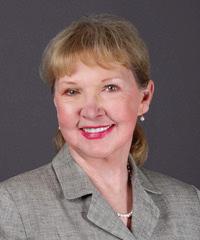
Meet Chris Richardson Richardson, 58, was born and raised in Springfield, Massachusetts. He studied mechanical engineering on a ROTC scholarship at the University of Pennsylvania. He went on to serve as an anti-tank missile platoon leader in Operation Desert Storm, then as an air assault rifle platoon leader and a commander of a maintenance supply unit.
His military career stationed him at various bases throughout the U.S., the Pentagon, Germany and South Korea, and included stints in the Middle East and Baltics. He retired from the Army after serving at Fort Carson as commander of a support brigade, running maintenance and logistics for the Army’s 4th Infantry Division.
He began his political career on the board of the Elizabeth School District and has served for nearly eight years on Elbert County’s three-member commission.
He is married with one daughter

who is a sophomore at Metro State University in Denver.
Meet Alessandra Navetta
Allesandra Navetta, 78, was born in Italy after World War II. Her father, seeking to make a better living than he could in their economically ravaged country, immigrated to Canada, where her mother and she followed a few years later, not speaking a word of English.
Navetta was raised and educated in Windsor, Canada, then married an American and moved to the Detroit area where she worked for 15 years as a nurse, including 10 years in a neonatal intensive care unit. She then went to law school and worked for 22 years as a lawyer specializing in medical malpractice. She also raised three sons.
She lives in Elizabeth where she raises horses and dogs, volunteers on the local library board and serves as vice-chair of the Elbert County Democratic County.
Elbert County government doesn’t often make headlines, but it did earlier this year when dramatically raising the pay of two top county staffers and skirting government transparency rules in the process.
Chris Richardson was one of Elbert’s three elected county commissioners who hiked the county attorney’s manager’s pay by 52% and the county manager’s salary 57% — a move he described as “timely” and “well deserved.”
Critics slammed it as outlandish, especially in a cash-strapped county whose workers long have complained they’re underpaid. Five county residents are suing Richardson and fellow commissioners for approving the contracts in secret, outside of Colorado’s open meetings law.
Richardson seems politically unscathed by the controversy, having easily snagged the Republican nomination for House District 56, a seat held for three terms by fellow Republican and former Arapahoe County Commissioner Rod Bockenfeld, who is not seeking re-election because of health reasons.
Even Democrat challenger Alessandra Navetta acknowledges Richardson is likely to prevail in a district whose electorate is about 12% Democrat, 40% unaffiliated and 45% Republican.
“I know he’s considered the favorite. But somebody needed to run against him,” she said.
House District includes the entirety of Elbert, Lincoln, Kit Carson, and Cheyenne counties, plus the eastern rural parts of Arapahoe, Adams, and El Paso counties. A 140-mile stretch along the Interstate 70 corridor from Denver International Airport to the
Kansas border runs through it. Its 11,000 square miles are mostly rural, with a horizon strewn with fields growing corn, hay, grain sorghum, oats, millet, sunflowers and wheat, and with an average of only eight residents per square mile.
Richardson, 58, lives outside of Elizabeth in unincorporated Elbert County. He moved there in 2010 before retiring a year later from a 23-year career in the Army as a colonel and brigade commander.
He and his wife, a real estate broker in Elizabeth, educated their now 19-year-old daughter in the Elizabeth School District, whose board he was elected to in his first stint in politics. He went on to serve the past eight years on Elbert County’s three-member elected county commission.
Richardson defends his move — and that of his two fellow commissioners — earlier this year drastically raising the salaries of County Manager Shawn Fletcher and County Attorney Bart Greer by more than $80,000 to $220,000 out of public view. He asserts that their decision was covered under a provision of Colorado’s open meetings law regarding the “day-today oversight of property or supervision of employees by county commissioners.” Still, to avoid the appearance of secrecy, the commission now aims to vote on the contracts in a public meeting Oct. 9.
Richardson said he is a strong believer in government transparency, citing his work ensuring that county commission meetings are live-streamed and videotaped.
“Certainly we have not always gotten everything right, but we’re not interested in surprising anybody,” he said. “I’ve always believed we should be doing all we can to ensure citizens know what we’re doing.”
He is proud to have helped lead his community through the COVID pandemic, which ended relatively fewer lives in Elbert than in other Colorado counties even though its population is about ten years older than the statewide average.
“We were able to get information to our citizens, accommodate public health and public safety aspects and still preserve some semblance of normal life in our county. I think that’s a pretty good accomplishment,” he said in an interview earlier this month.
when it comes to mental health assessments and decisions about their childrens’ gender identities. He’s also concerned about an influx of undocumented immigrants in Colorado — the result, he says, “of a completely uncontrolled border.” He is alarmed by what some far-right politicians have deemed this election season as a crisis with Tren de Aragua, a Venezuelan prison gang also known as TdA, in Aurora despite assertions by police that the group is not a significant threat.
“When you hear of activity of truly organized gangs and criminal enterprises nearby, it’s very concerning,” he said.
Although he shares the views of some right-wing politicians who have fueled fears about the gang — U.S. Rep. Lauren Boebert, Aurora Councilwoman Danielle Jurinsky and Donald Trump among them — he said his leadership style is far more low-key.
“I’m pretty slow and steady in how I do business. Grandstanding doesn’t do a lot for me,” he said.
Richardson had raised about $12,000 in contributions by early October. He has campaigned mainly at fairs, festivals, rodeos and events leading up to the Republican primary in Congressional District 4, which drew heavy turnout because 11 candidates ran, including Boebert, the winner.
There have been no debates in the House race that Navetta, Richardson’s Democratic opponent, cites voter affiliation statistics in acknowledging she has a slim chance of winning.
The 78-year-old worked for 15 years as a nurse and for 22 years as a medical malpractice attorney. She lives on five acres in Elizabeth where she keeps two horses, serves as a trustee of the Pines and Plains Libraries and vice-chair of the Elbert County Democratic County. She stepped up to run in the race “no other Democrat wanted” because, she said, “we really need two parties, two points of view” in any election.
“We can’t have people just waltzing into office without being challenged,” she added, citing Richardson’s involvement in the secret pay raise controversy as reason enough to run.
Navetta has logged 5,000 miles driving around the district, sometimes dragging some of her grandchildren with her, in a grassroots campaign for which she has raised about $4,000.







He is also proud of the regional and statewide work he has done as a county commissioner. He has represented the Eastern Plains on Colorado Counties Inc., the statewide coalition of county officials, and served as the chair of the East Central Council of Local Governments; co-chaired the regional transportation body for Northeast Colorado and served on a statewide transportation advisory council; and sat on task forces seeking to abate opioid use and that reviewed recent legislation for a property tax reduction.
She speaks to voters about the need for affordable, quality health care in the district, where the few rural hospitals are barely surviving.
“We need to find solutions to funding and staffing these facilities so that the residents of these communities do not have to travel for hours for medical care,” she said.

He told the Sentinel he planned to retire from politics after being term-limited off Elbert County Commission this year but decided to run to replace Bockenfeld “as a way to give back to the community.”
If elected, Richardson aims to protect agricultural land and water in that part of the state and to ensure that roads on the Eastern Plains are safe and well maintained. Those, he says, are the top issues in the district.
As he sees it, far too many bills are introduced each legislative session.
“We’ve hit the point that we’re making laws just to fix other laws,” he said, noting he would work to ensure that legislation “helps rather than hurts people, and doesn’t create unintended consequences.”

The conservative Republican wants to curtail efforts to regulate gun ownership in Colorado, saying most of that legislation “should go away.”
He opposes abortion and says, “I am disappointed at the direction Colorado has taken” by allowing the procedure.
He is concerned that schools and government have usurped parental rights
She also is pushing for more affordable post-secondary education in the district because she says residents have too far to travel to attend college-level classes. She would, if elected, push to use high schools and other community buildings to host college-level programs. She also would try to glean federal funding for more reliable, affordable internet connectivity, which could help locals access more health care providers and online education
“Obtaining these funds and improving internet access will result in an improvement in many aspects of the lives of the citizens of HD56,” she said. Born in Italy, raised in Canada, and having spent most of her career in and near Detroit, Navetta knows she speaks faster and with more intensity than many residents of her large district. She hopes her energy and enthusiasm, and her status as “the only one in this race who’s not a professional politician” will prod voters, especially unaffiliated ones, to check her name on their ballots.
“I’m at a point in my life where I want to serve people,” she said.”I’m not counting on winning, but it’s not an impossibility.”
— Susan Greene, Sentinel Reporter in Residence


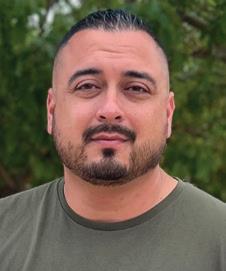
State Senate District 28:
Meet Mike Weissman
Mike Weissman, 47, has lived in Aurora for 18 years — nearly eight of which he served as representative of House District 36. In that seat, he touts having helped pass more than 110 bills and resolutions since 2017.
He has chaired the House Judiciary Committee and recently served on the Committee on Legal Services.
Weissman has been active since 2004 in Colorado’s Democratic Party, which his partner Morgan Carroll chaired for several years.
According to his LinkedIn page, he worked for seven months in 2014 as the party’s voter protection director and as an advisor to the Wilderness Society for nearly two years in 2015 and 2016.
He graduated with a bachelor’s degree in economics from Tufts University in 1999 and from the University of Colorado Law School in 2014
Meet Pedro Espinoza
Pedro Espinoza, 37, is a Los Angeles native who has lived in Colorado for 22 years.
He received a high school diploma from Aurora Central High School and attended some college at Community College of Aurora studying criminal justice. He served in the U.S. Army National Guard from 2006 to 2019, having fought in Iraq in 2009.
Espinoza has worked for nearly 13 years as state correctional officer at the Denver Reception and Diagnostic Center. The prison is often the first stop for state inmates to be evaluated before being transferred to other prisons.
He is married, has three children — two son ages 20 and 9, and one 12-year-old daughter, and lives in Aurora.
Mike Weissman, if elected to Colorado’s Senate District 28, aims to focus largely on curbing — or at least exposing — the influence of money in politics. Campaign finance has always intrigued the lawyer and policy wonk from Aurora, but the issue became more personal this election cycle.
The longtime state representative narrowly beat business attorney Idris Keith in an unexpectedly tight Democratic primary influenced by an unprecedented infusion of so-called dark money from a group seeking to defeat him. The June primary was the most expensive in state history, and the group’s backers remain unknown more than three months later.
Weissman, 47, has a long history of standing up to corporate interests. His own campaign benefitted from about $300,000 in spending from groups known to support public education, environmental conservation and labor unions. The far lesser-known Keith enjoyed about $400,000 in spending from two different groups, including one called Representation Matters, an independent expenditure committee, which is similar to a super PAC and has no traceable bankrollers or agenda.
Reporting by the Colorado Sun shows Representation Matters registered at the Colorado’s Secretary of State’s Office with the specific purpose of helping Keith, a more pro-business Democratic who did not respond to comment for this story. That was on May 20, three days after it had sent out one of its mailers boosting
Keith’s campaign. Two days later, as The Sun reported, the group received $320,000 from another state spending committee, Brighter Colorado Futures, which that same week had gleaned $315,000 from a federal super PAC called Democracy Wins. The source of that PAC’s money remains unclear.
Weissman describes the influx of dark money intended to tank his primary bid as “stressful” and “surreal.” He knows he can’t change federal campaign finance laws or reverse policy, including U.S. Supreme Court decisions, letting big and dark money flow into politics. But, if elected to Colorado’s Senate, he said he would try to ensure “we have more and faster information about who is spending money to influence elections.”
“We should be able to find out who these donors are beyond P.O. boxes and, ideally, what is motivating their involvement,” he said. “What experience has shown this year is we have to tighten things up so that there’s less ability to hide what’s going on.”
Senate District 28 straddles Adams and Arapahoe counties, and includes northern Aurora, Watkins and Aetna Estates. It has been represented since 2017 by Sen. Rhonda Fields, who is term-limited out of the seat and running for the Arapahoe County Commission. Democrats more than double the number of Republicans in the district, which has an even higher number of unaffiliated voters.
Pedro Espinoza, 37, won the Republican Party’s nomination for the seat in June. The political newcomer said he was inspired to run because, “I don’t like the way the state and country are going right now.”
He has not debated Weissman — nor even met him, for that matter — but said Weissman’s service in the state House since 2017 “didn’t set the economy or state in the right direction.”
“It’s time for him to step aside,” Espinoza said.
He aims, if elected, to “put more money into people’s pockets” and “curb illegal immigration,” but could not say how he might accomplish either goal. The father of two sons, ages 9 and 20, and one 12-year-old daughter cited another top priority — “protecting female sports” from participation by athletes who were not born biologically female.
“I feel my daughter shouldn’t have to share a locker room with a biological male,” he said.
Asked why he feels so strongly about the issue, he added, “You know, private parts being exposed and all.”
Espinoza has worked for nearly 13 years as a correctional officer at the state-run Denver Reception and Diagnostic Center. Colorado’s crime rate is “skyrocketing out of control,” he said.
Statistics provided by Colorado Bureau of Investigation show a drop in violent crime in the first six months of 2024 compared to the last few years, even though Colorado’s rate does remain higher than the national average.
Espinoza calls for “criminals to be held more accountable” in Colorado, but could not say how or what legislation he might push to make that happen. “I guess can I pass on that for now?” he asked the Sentinel, but did not follow up with specifics.
He had raised about $800 in campaign contributions by the first week in October.
Weissman, for his part, raised about $170,000.
The licensed attorney does not practice law and has worked for nearly eight years representing House District 36, a seat from which he is now term-limited.
As chairperson of the House Judiciary Committee, he was influential in passing laws advancing criminal justice reforms and civil liberties. He has been an outspoken defender of workers’ rights and a reformer of the
state tax code to make it work better for small businesses and seniors. He was a key player behind bills updating Colorado’s anti-trust laws, preventing price gouging and restricting multi-million dollar credits that were benefitting insurance companies. He tried limiting developers’ taxing authority through metropolitan districts — a move that was blocked by deep-pocketed home builders.
They or any number of other big-money interests could have had reason to back the dark-money efforts to defeat him in a primary race in which he managed to edge out Idris Keith by six percentage points.
“Basically, if you try this, if you construe your oath on the Constitution, as I do, as standing up for people against powerful interests, the powerful interests will fight back and bid to the extent of almost $800,000 of independent spending against you,” he said.
Aside from exploring ways to ensure more and faster transparency around state political spending, Weissman said he wants to continue his reforming the state tax code, which he describes as a “moral document” he thinks should do more to level the playing field for Coloradans. He also hopes to remove barriers in Colorado’s consumer protection policies to make legal remedies easier to win.
Weissman’s House district includes an apartment complex on Nome Street that Aurora city government shut down in August because of blighted conditions. Senate District 28 includes another complex owned by the same company that has similar blight and became the focus of a widely publicized controversy this summer about Venezuelan immigrants and the presence of Tren de Aragua, a Venezuelan prison gang also known as TdA in the city. Weissman slammed Aurora Council Member Danielle Jurinsky and Mayor Mike Coffman, both right-wing Republicans, for scapegoating immigrants over problems caused by “an absentee landlord.”
“Their job, no matter what their political party, is to help their constituents. But here you have public officials having harmed people in their own city,” he said.
He noted his work in the House on legislation empowering the Attorney General’s office to enforce habitability laws on behalf of tenants, but acknowledged the caseload is too high for that office to handle alone. He aims to keep exploring more ways to hold landlords more accountable for blighted conditions in their buildings.
“These issues are challenging and we have more to do,” he said. “That’s part of why I’m running again.”
— Susan Greene, Sentinel Reporter in Residence
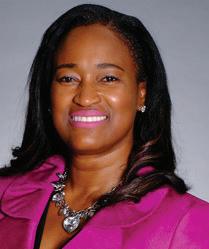


Meet Naquetta Ricks
Naquetta Ricks, age unspecified (don’t ask), immigrated to Colorado more than 40 years ago, fleeing her native Liberia as a child after a bloody coup that threatened her mother’s life and killed her mother’s fiancé.
Educated in Aurora Public Schools, she received her bachelor’s degree in accounting at Metro State University and her master’s in business administration from the University of Colorado Denver. She owns a small mortgage brokerage company, is the founder and president of the African Chamber of Commerce, Colorado USA, is divorced and has a 27-year-old daughter.
Having won her first term representing southeast Aurora in 2020, Ricks has served as vice chairperson of the House Committee on Business Affairs & Labor, a member of the State Veterans & Military Affairs Committee, and also the House Chairperson for the Democratic Women’s Caucus.
Meet Darryll Gibbs
According to his website, Gibbs moved to Colorado in 1995. It says he served in the Air Force Reserves for nearly two decades and worked in the Denver Police Department before starting a business as the owner and operator of a trucking business.
His website notes that his grandmother had 25 children and that “her life was a testament to perseverance, working from cleaning houses to picking cotton, and always with a .38 in her purse for protection.”
Democratic mortgage broker Naquetta Ricks is seeking a third term representing House District 40, challenged by Republican trucker Darryl Gibbs.
Ricks in 2020 became the first African immigrant to be elected to the Colorado Legislature, and the first Liberian American to win a seat in any state capitol. She owns a small mortgage brokerage company and is the founder and president of the African Chamber of Commerce, Colorado USA.
She declines to say her age, asserting that, “I don’t want to play into this whole ageism thing.”
Ricks, her sister and mother fled to the U.S. from their native Liberia in 1980 after a military coup in which her mother’s fiancé, the country’s agriculture minister at the time, was assassinated. She remembers the horror of watching as he and her mother were held at gunpoint.
She attended Aurora public schools, received her bachelor’s degree in accounting at Metro State University and her master’s in business administration from the University of Colorado Denver. The Aurora resident is divorced and has a 27-year-old daughter.
Having won her first term representing southeast Aurora in 2020, she has served as vice chairperson of the House Committee on Business Affairs & Labor, a member of the State Veterans & Military Affairs Committee, and also the House Chairperson for the Democratic Women’s Caucus.
Ricks said she is proud of her legislation preventing homeowners associations from foreclosing on homes because of overdue fees. She touts her work ending predatory towing practices and prohibiting excessive towing and impoundment fees.
She helped pass a law ensuring that medical debt cannot be factored into a person’s credit score. She championed a policy allowing relatives of people receiving mental health treatment to share information about their loved ones’ behavior with their care providers. “It removes barriers for input,” she said. Also on mental health care, she helped create a law requiring Medicaid to pay for culturally appropriate forms of treatment, when needed.
Ricks also highlights her work on legislation that:
• Deletes the names of children from criminal justice records
• Established a state fund providing legal defense for immigrants facing possible deportation
• Includes more minority-owned businesses in state procurement and contracting
• And analyzes the financial impact systemic racism has had on African Americans in Colorado
Noting that state government is anticipating a budget shortfall next session, she told the Sentinel,“It’s important to have people in office who understand what it’s like to face high grocery prices, make sure we can support our senior citizens, housing and transportation needs, veterans needs, education.”
She speaks in support of Aurora’s Venezuelan immigrants who were singled out this summer by rightwing politicians in what she calls election-season fear-mongering and “hysteria.”
“If someone is breaking the law,











SENTINELCOLORADO.COM |
10, 2024 they’ll be prosecuted. But most of these people are just seeking a better life,” she said. “For the Mayor (Mike Coffman) and Councilwoman (Danielle Jurinsky) to make this a political opportunity says a lot about their characters.”
Ricks raised about $40,000 in campaign contributions as of early October.
Her Republican opponent, Darryl Gibbs, has not responded to inquiries by the Sentinel to discuss his background, political views or campaign.
His website indicates is a trucker who previously worked with the Denver Police Department and served in the Air Force Reserves for nearly two decades. It lists his priorities, if he’s elected, as addressing the cost of living, affordable housing, supporting veterans, strengthening public safety, improving education, and reforming immigration. His site does not, however, specify what he would do on those issues.
Gibbs has posted videos of himself on social media talking about his rightwing political views while driving his truck. In one, he calls undocumented immigrants “retards” and says of Kamala Harris, “She is not Black, she is Asian.” He, incidentally, is Black — a term he said he dislikes because his skin is actually brown.
“Here in Colorado, it’s crap. Our system is crap. Period,” he continues, speaking into a camera on his semi’s dashboard. “I’ll tell you what, this November, these state legislators, you need to start firing these people because they’re not fighting for you because they don’t care.”
—SusanGreene, Sentinelreporterinresidence



Meet Iman Jodeh
Incumbent Iman Jodeh, 42, is a first generation American, the daughter of Palestinian immigrants and refugees. She was born and raised in Aurora and has lived in House District 41 her entire life. She attended Aurora public schools and received undergraduate and graduate degrees in political science from the University of Colorado, Denver.
Jodeh was first elected to the
House in 2020. She has served as the longtime executive director of Meet the Middle East, a nonprofit organization aimed at building relationships between the U.S. and the Middle East through cultural events, consulting, classes and travel. She co-founded the Colorado Muslim Leadership Council and is the spokesperson for the Colorado Muslim Society. She has worked since 2018 as a community advocate and liaison for the Interfaith Alliance of Colorado. And she taught continuing education courses at the University of Denver on Islam, Muslim culture and the Israeli-Palestinian conflict.
She is married and has a 1-year old daughter.
Meet Robert McKenna
Robert McKenna, 41, is a compliance specialist at Winn-Marion Barber, LLC, an oil and gas contractor in Centennial. He said he would quit that position if elected.
Born and raised in Staten Island, New York, he has a bachelor’s in history from St. Francis College in Brooklyn and a law degree from the University of St. Thomas School of Law in Minneapolis.
Rather than practicing law, McKenna enlisted in the Army at age 27 and moved to Colorado when stationed at Fort Carson in 2012. He served in the Army until 2016, and now serves as a captain in the Army Reserves specializing in psychological operations.
He was divorced 14 years ago, and his mother, father and brother live in New York.
Two factions in Aurora politics have made national headlines in the last two months.
One, led by far-right Republicans, has raised fears of immigrants, anxiety about a Venezuelan gang’s presence in the city and concerns that federal immigration policy is threatening Aurora’s safety.
The other, led by Democrats and immigrants themselves, has rallied around Venezuelans newly arrived in Colorado’s most diverse city, against a landlord who critics say has demonized them to justify blight in his apartment complexes, and against election season xenophobia.
There is perhaps no race depicting this contrast more than the one between State Rep. Iman Jodeh and Rob McKenna in House District 41. The district is bounded by Tower Road to the east, Hampden Avenue to the south, Dayton Street to the west and Mississippi Avenue to the north.
Jodeh, 42, the incumbent, is a lifelong Auroran and daughter of Palestinian immigrants who has spent her career advocating for the rights of people who, like her parents, came to the U.S. seeking better, safer lives.
The progressive Democrat leads programs building relationships with and cultural understanding of Middle Easterners. She serves as a community advocate for the Interfaith Alliance of Colorado. And, as co-founder of the Colorado Muslim Leadership Council and spokesperson for the Colorado Muslim Society, she has fought Islamophobia and racism.
Jodeh has spoken out in recent weeks against what she says are racist efforts by Aurora Councilwoman Daniel Jurinsky and other Republicans blaming Venezuelan immigrants for blighted conditions in three northwest Aurora apartment complexes and exaggerating the threat posed by a Venezuelan prison gang called Tren de Aragua, also known as TdA, in the city.
An owner of CBZ Management, which runs the three apartments complexes in question, has blamed TdA members and other Venezuelan tenants for disrepair, leaks, mold and pest infestations in his blighted buildings — problems that city officials have said stem from the company itself. Still, false claims about Venezuelan immigrants in Aurora have been paroted by candidates ranging from McKenna, Jodeh’s little-known Republican challenger, to Donald Trump.
“The Republican Party has weaponized problems with these apartment complexes to make it about failed immigration policies of the Biden administrations,” she said. “They need to stop vilifying Venezuelans.”
Jodeh says her policy agenda “is informed by basic human rights,” which she notes are as much a state issue as an international one. “It means the right to housing, clean air, access to jobs and education and health care for all,” she said.
On health care, she is most proud of her legislation relieving and at times forgiving medical debt and ensuring birth doulas are covered by insurance. On housing, she touts her work extending eviction processes from 48 hours to 10 days to “avoid putting people on a path of homelessness.” She highlights her legislation making eviction proceedings accessible remotely “so more people can defend themselves” at hearings. On immigration, she points to her efforts helping establish the state Office of New Americans as a hub for immigrants seeking to navigate life in Colorado.
If re-elected, Jodeh aims to continue pushing social policies that help immigrants and other vulnerable communities.
“When you have my identity markers as a Palestinian Muslim woman in America, you really don’t know anything other than how to advocate,” she said.
Her advocacy work intensified last fall when, following Hamas’ and its

allies’ Oct. 7, 2023 attack that killed 1,139 people in Israel, Israel waged a war in Gaza that had killed 41,595 Palestinians there as of the end of September. Photos and video footage of dead and wounded Palestinian babies the age of her own daughter, who was born a month before the war, have haunted her, she said.
Late last year, Jodeh circulated a letter to Colorado’s congressional delegation calling for hostages to be released, humanitarian aid to be allowed into Gaza, a ceasefire and U.S. involvement brokering a lasting Palestinian-Israeli peace. She was dismayed that many longtime political allies and even friends wouldn’t sign it:
“It was really hard to hear from my colleagues that a Palestinian life didn’t mean as much as the life of an Israeli. I felt a sense of abandonment.”
Nearly a year later, she continues speaking at rallies and urging members of Congress to press for an end to what she sees as Israel’s genocide in Gaza, but has no plans to circulate another ceasefire letter.
“If people haven’t said anything by now on their own volition, then I don’t know how to help you.”
It has been gutting, especially as a new mother, she added, to “very much come to think I will never see a Palestinian state in my lifetime.”
Jodeh said in early October that her campaign had raised about $13,000 in her race against McKenna, who said he had raised $1,569.
Both candidates discussed issues at a recent forum at Heather Gardens that marked one of McKenna’s main opportunities to make himself known in the community.
The 41-year-old was born and raised in Staten Island, New York. He graduated from law school and enlisted in the Army at age 27, was transferred to Fort Carson in 2012, left regular service in 2016, and since has served in the Army reserves working in psychological operations, which mainly involves monitoring military interrogations.
“Capt. Robert McKenna cannot make any official statements,” he told the Sentinelof his service, noting that military personnel are precluded from conducting psychological operations against the American public. Still, he said his psychops training has given him skills “to analyze what people are saying to me and what is being said both in the traditional media and social media.”
Robert McKenna, the candidate, is free to talk about the issues, and he does.
Although he has a law degree, McKenna is not a licensed attorney and works as a compliance specialist for Winn-Marion Barber, LLC, an oil and gas contractor in Centennial.
Drawn by what he calls its “Leave it to Beaver, homey feel,” he has lived in House District 41 since 2017. He has been active as a district captain and delegate to county and state Republican conventions, and decided to run for the state House because, as he tells it, “there needs to be a change to state government’s current trajectory.”
“It’s going too far to the left,” he said, citing Jodeh and her progressive politics as examples.
Describing himself as a “6’ 3’’ soldier,” McKenna said he feels safe in Aurora, but “that is not the case with everybody.” He is running largely in hopes of enacting what he calls “tighter controls on both crime and illegal immigration in the district and state as a whole.” He noted he is especially concerned about the recent influx of Venezuelans to metro Denver and was rattled by a home-security video depicting armed men in an Aurora apartment hallway that went viral in August and became the focus of heated controversy about Venezuelan immigrants and gang members in the city.
Aurora police have repeatedly said, that as of Oct. 4, investigations had not shown any of the men depicted in the video to be members of “any organized crime.”
“I actually saw the video before it was released to the media,” he said, underscoring his aim to “clean up
gang activity and clean up illegal immigration.”
He welcomes Trump’s frequent references this campaign season to Aurora and fears about TdA gang members overrunning the city. “I don’t agree 110 percent with everything (he says), but I’m definitely in the 90-plus percent,” he said of Trump.
He said he knows he is a longshot in a predominantly Democratic district. He alsoacknowledges he doesn’t know much about state government and has never attended a legislative hearing in Colorado. Still, if elected, he wants to “get tougher on crime, impose tougher prison sentences and more prison time for violent offenders and property damages.” He also wants to work toward deregulating the oil and gas industry in Colorado and preserving the Taxpayer Bill of Rights (TABOR), enacted by voters in 1992 to limit the amount of revenue governments in Colorado can retain and spend.
His main criticism of Jodeh is a common Republican talking point this election season: That she is “giving more support than I think is necessary to illegal immigrants.”
“I would just ask the people of Aurora, of my community, that if you would like a change, give me a vote. If you like the status quo, then don’t vote for me,” he said.
—SusanGreene, Sentinelreporterinresidence
APS asks for voters to OK 2 spending questions — with no tax increases
The Aurora Public Schools Board of Education has placed two significant funding measures on the November 2024 ballot: a $1 billion bond issue and a $30 million annual mill levy change — neither of which will increase property taxes.
“We’ve done enough homework and proactive financial planning for this so that you can approve this and that your taxes won’t go up,” said Brett Johnson, APS Chief Financial Officer
If passed, these measures are intended to provide funding for the district to improve infrastructure, enhance learning environments and expand educational programming.
“I’m not discounting that a billion isn’t a lot, but those dollars do not go as far as they did eight years ago during our last bond, and so I’m confident in the analysis that was put in for the bond package,” Johnson said.
The no-change bond and mill levy is possible basically because a previous bond issue is ending and the new bond issue would take its place.
“The bond and the capital mill levy offset each other with a difference, and that’s why people would not pay anything more if they approve both of these measures,” said Corey Christiansen, APS spokesperson. “In fact, we can even lower the amount that we assess for a bond next year and still be able to take on a billion dollars worth of new bond funding.”
With the passage of the 2024 Bond Program, the mill rate would decrease from 21.900 mills to 15.900 mills, according to the Aurora Public Schools website. If both the bond and capital mill levy are passed, the total mill rate for Aurora taxpayers in 2025 would stay at 44.096, meaning there would be no net tax increase. If a home’s value remains unchanged from 2023 to 2024, the taxable mill rate will remain unchanged.
A traditional bond issue provides a one-time investment for significant projects like a new building or renovation, a mill-levy override is for staff, mental health programs and after school care. A capital mill levy is new and offers continuous funding for building maintenance and smaller-scale improvements.
“A mill-levy override is something we would use as a funding stream for people and programs,” Christianson said. “The capital mill levy overrides. That’s a new one that the state approved a few years ago so that school districts can be able to have a dedicated funding stream to be able to take care of maintenance on our buildings.”
Typically, those maintenance costs would come out of the general fund, he said.
The proposed $1 billion bond program is an investment in improving and enhancing school facilities, infrastructure and technology across the Aurora School District.
Some of the main initiatives that the bond issue would fund include:
Enhanced Health, Safety and Security: Investments in safety and security of schools, ensuring students and staff have secure environments conducive to learning.
New Healthcare-Focused Job Skills Training High School: The construction of a new high school that focuses on healthcare job training, helping students develop skills for in-demand careers in healthcare.
Career & Technical Education
Expansion: Expanding career and technical education opportunities for students to gain practical, real-world skills in various trades and technical fields.
The capital mill levy would free up money from the general fund to pay for ongoing building maintenance and smaller-scale improvements, attracting and retaining teachers by increasing salaries, mental health resources, counseling services and career, technology and skilled trades classes.
Although property values have increased, Aurora Public Schools aren’t seeing much more funding overall, officials said. School funding is based on a per-student formula that adjusts annually for inflation. Aurora Public Schools will get a 5.2% increase for 2024-25, regardless of property tax revenue. The total funding stays the same, but the split between local and state contributions changes, according to the website.
Schools are facing unpredictable financial burdens from the loss of federal pandemic relief funds and the rising costs due to inflation and higher labor and construction expenses. Because of this, school districts are increasingly turning to bond measures and mill levies for additional financial support.
“The billion word sounds like a really big number to a lot of folks, and it’s important to give context as to why we’ve reached that mark,” Johnson said. “And the reason is because of our construction costs.”
He explained that eight years ago, when they last asked for a bond from voters, it cost them $30 to $35 million to build a preschool through eighth grade building, and now it would cost $80 to $90 million.
To keep up with the growth, the district needs to build at least two new preschool through eighth grade buildings and a high school. A high school used to cost between $95 to $115 million and now costs $220 to $230 million, Corey said.
“That’s almost half of a billion dollars right there,” Johnson said. “The dollars don’t stretch as much”
—CassandraBallard,Sentinel StaffWriter
Two tax elections in Cherry Creek schools include plans for backlogged maintenance, teacher salaries and expanded Innovation Campus
The Cherry Creek School District mill levy and bond package, which will be on the November ballot, aims to invest in safety, innovation, teacher pay and building maintenance, proponents say.
“If you don’t pass bonds for a long time, you have to cut your classrooms in order to accomplish that,” said Scott Smith, chief financial and operating officer for Cherry Creek School District.
The package includes a $9 million mill levy increase and a $950 million bond issue, which will cost residents
less than $15 monthly for the average home in Arapahoe County, valued at $500,000. This translates to charging homeowners less than $3 monthly for every $100,000 property value, according to officials.
In Colorado, voter approved milllevy increases, or overrides, raise property taxes for school district operating expenses. Voter approved bond issues raise property taxes for capital improvement expenses only.
If approved by voters, projects include increased school security, expanding the Cherry Creek Innovation Campus, increasing teacher salaries, student mental health support and addressing maintenance needs on aging campuses.
“We have about 8 million square feet of space, and it costs us roughly $40 million a year to maintain that,” Smith said.
The package is a sum the school district put together through extensive planning and input from community members, according to the Director of Strategic Communications and External Affairs for Cherry Creek School District, Ashley Verville.
Although property taxes in the district, and across the state, have increased, the schools do not necessarily receive those additional funds.
“When local property taxes go up, school districts get more money from their local voters,” Verville said. “We’re getting more from our local taxpayers, but the state’s contribution goes down. So it’s just that mix that changes. But our bottom line, our per-pupil funding stays the same.”
With growth of the district and expansion of services and programs provided to students, revenues have not kept pace with expenses.
“A lot of people in our district don’t realize we educate as many students in Aurora as Aurora Public Schools does,” Smith said. “Aurora is a key, if not the largest, community that we serve in Cherry Creek.”
Cherry Creek is the fourth largest school district in Colorado, with 52,409 students. Although Cherry Creek is located in Centennial, Arapahoe County, Greenwood Village and Aurora, Cherry Creek Schools make up much of Aurora.
What the bond and mill levy will pay for:
Safety and Security: This includes hiring more trained security personnel and installing safety enhancements like ballistic window film. It also covers replacing outdated security cameras and improving school access control systems.
Innovation in Education: expanding the Cherry Creek Innovation Campus, which offers students hands-on training in high-demand career fields. The expansion will allow the innovation campus to accommodate 70% more students and develop or expand 10 additional career pathways. The campus has been a big success, with programs filling up immediately. With expansion, many students can take advantage of a career-starting opportunity to obtain higher-paying jobs right out of high school.
Smith said that times have changed since students chose between college and the trades. Now, they can get a head start in schooling for their careers in high school.
“These are very real careers that we’re able to help our kids access,” Smith said
Teacher salaries: The funding will support maintaining competitive salaries and teacher benefits, ensuring that Cherry Creek schools remain competitive in recruiting and retaining teaching talent, officials said.
Healthy, Innovative Learning Environments: A portion of the bond will be dedicated to replacing aging and deteriorating school buildings on three of the district’s oldest campuses: Laredo/Smoky Hill, Prairie/Overland, and the Cherry Creek K-12 campus.
“We are replacing buildings that
have reached the end of their useful life, but making sure that we keep and honor the history and tradition that has existed in all of these facilities,” Smith said.
Student Health and Wellbeing: The package includes additional student mental health and well-being resources.
Major Maintenance Projects: Due to budget reductions during the COVID-19 pandemic, the district faces more than $300 million in deferred maintenance needs. This bond issue will help address critical repairs and maintenance across the district, ensuring that buildings and infrastructure are safe, functional and up-todate.
Since Colorado’s School Finance Act does not fund facilities or capital projects under the 1994 School Finance Act, districts must ask voters for additional funds. School districts must rely on bond measures and mill levies to raise funds to maintain and improve their facilities and programs.
A mill levy override supplements a school district’s operating budget, covering salaries, staffing, technology, supplies, transportation and utilities. It is funded through local property taxes and requires voter approval.
A recent change to the School Finance Act allowed Cherry Creek School District’s mill levy override limit to increase from 25% to 30% of its total program, Verville said.
A capital construction bond funds school district capital expenses, such as building and renovating schools, updating systems (heating, roofs, wiring), safety projects and larger technology purchases. Bonds are funded through local property taxes and require voter approval. Cherry Creek School District, with a strong credit rating, can issue tax-exempt bonds at low interest rates to cover these longterm costs, according to officials.
—CassandraBallard, SentinelStaffWriter
Arapahoe County voters will decide whether the county can collect and keep more property taxes from its residents.
The proposal, set for the ballot, is what’s known as a “de-Brucing” measure, a legal adjustment of a local government’s relationship with revenue limits set by the Taxpayer’s Bill of Rights, or TABOR. The measure, if passed, would eliminate the revenue cap set by TABOR, allowing the county to keep up to an additional $72 million per year from property taxes.
In a 4-1 vote, the commissioners referred the measure to the Nov. 5 ballot, with District 3 Commissioner Jeff Baker dissenting. He said many of his constituents opposed the measure going to the ballot.
In Colorado, over 50 of the state’s 64 counties have passed similar measures to eliminate TABOR revenue caps, including historically conservative Douglas and El Paso counties.
For months, Araphoe County has been sounding the alarm bells on a budgetary crisis that could prompt cuts to some essential services. If the measure is passed, the county hopes the additional revenue would help it avert or reduce cuts.
“This county’s belt is tight,” District 2 Commissioner Jessica Campbell said at an Aug. 20 public hearing. “There’s no tightening of a belt that can happen here without losing levels of service.”
Without more revenue, the county would look at up to $35 million in cuts next year, including up to $12 million from the sheriff’s office, up to $3.7 million from public works and up to $4.7 million from community resources, public health and human services.
tax rate is $15.821 per $1,000 of assessed property value. But, because of revenue limits set by TABOR, the county is permitted to retain $11.206 per $1,000 of assessed property value in 2024, which comes out to about $32 per month for a property valued at $500,000. This money, plus declining one-time funds from the pandemic, funds county services. If the measure is passed, the county will be able to collect and retain $15.821 per $1,000 of assessed property value, which would be about $44 per month on a home valued at $500,000.
Natalie Menten, a member of the TABOR Foundation, a group that advocates for TABOR, spoke at the public hearing against placing the measure on the ballot. She said the ballot language does not make it clear that more money will be going from residents’ wallets to the county.
“The ballot language is misleading, and it’s unfortunate the county spent taxpayers’ dollars … to go out and do that public persuasion that was presented in the earlier section of this meeting,” she said, noting the county’s public events and outreach related to the ballot measure.
tSome residents spoke in support of the measure, expressing concern about what declining funds would mean for county services. Some spoke on behalf of social service organizations including Family Tree and Gateway Domestic Violence Services, saying they would no longer be able to provide their services without the county’s financial support.
Others spoke about county services they fear losing.
“It’s about time that this group of county commissioners puts this issue on the ballot,” one resident said. “I’m old. I’m getting older by the minute. And there’s a large population — the state of Colorado is aging — and many of them are going to need services that they’re going to come to the county for.”
Campbell said the commissioners were respecting TABOR by bringing the measure to the voters.
“America is about self-determination,” she said. “That’s what TABOR does. TABOR — and in what we are doing here, in referring something to the ballot … that is consent of the governed. We are not eradicating TABOR. This is part of TABOR.”
District 1 Commissioner Carrie-Warren-Gully said she recognizes that people across the county are struggling financially.
“We see people sitting around their kitchen tables struggling, and we want to recognize that,” she said. “But we, too, sit around the commissioner’s conference table and make equally difficult decisions.”
If voters approve the ballot measure, the county would still need to bring tax measures to voters regarding mill levy increases and sales taxes, county attorney Ron Carl said.
Spending from the property taxes would be reported in an annual audit and would be reviewed by a resident advisory committee, said Michelle Halstead, director of the commissioners’ office.
—NinaJoss, ColoradoCommunityMedia





Meet Bernard Celestin
Bernard Celestin moved to Colorado 40 years ago after being honorably discharged from the U.S. Army’s 24th Psychological Operations unit.
Inspired by his father, Celestin has impacted his community as a commissioner, board member and advocate for child and adolescent services, according to his RTD bio.
Despite losing his campaign for the Aurora City Council four years ago, Celestin found a new passion as an RTD bus operator. He worked as a bus driver for RTD for 14 years and completed a two-year leadership academy with RTD.
He views public transportation as vital, providing essential services to a diverse population.
Celestin takes pride in small acts of service, such as helping passengers and ensuring safety.
He has participated in leadership programs and remains active in community service through his church and various organizations.
At 64, he focuses on home life with his wife of 39 years, Robbyn, eager for new opportunities to serve his community.
Meet Kathleen Chandler
Kathleen Chandler is a fourth-generation Colorado native who grew up in southern Colorado and has lived in Arapahoe County since 1995, according to her campaign website.
As a single mother who relied on RTD to transport her son to violin lessons while working downtown, she experienced firsthand the challenges of inadequate transportation, she states. This struggle underscored the need for better mobility options to empower families pursuing a better life.
She emphasizes the importance of transportation and mobility for fostering a prosperous community, and she highlights that access to jobs, schools and safe neighborhoods is crucial for individuals to reach their full potential.
Chandler is also the Director of the Independence Institute’s Citizen Involvement Project and a political consultant. According to her bio, she holds a Political Science degree from the University of Colorado at Colorado Springs and has been active in politics since age 18, supporting conservative causes and candidates.
RTD District F is located East of 225, between Colfax Avenue and E. Belleview Ave. The district covers the most eastern part of Aurora.
As Colorado prepares for another election cycle, two candidates with personal connections to the state’s public transportation system are stepping up to offer their vision for improv-


Finance Director Todd Weaver said the county’s authorized property







“Ours should be a limited government, focused on protecting our rights, leaving our families & businesses alone, and staying out of our pocketbooks.”
District 56

ing mobility and serving the community in RTD District F. District F is essentially Aurora east of I-225, south of East Colfax Avenue and north of Parker Road.
Bernard Celestin is a former U.S. Army veteran and longtime RTD bus driver, and Kathleen Chandler is a political consultant and advocate for conservative causes. Their contrasting views offer voters a choice between hands-on service experience and a focus on broader policy reform.
Both candidates highlight the importance of transportation in their careers. Celestin, as a former RTD bus operator, has firsthand experience with the challenges and significance of public transit. Chandler emphasizes transportation as essential for empowering families and ensuring access to jobs and education, based on her own experiences as a working single mother.
Celestin advocates for identifying nearby routes and using shuttles like Access-A-Ride to address service limitations. Chandler calls for RTD to assess population needs, improve accessibility, and consolidate underperforming services.
Both emphasize enhancing service efficiency but differ in their approaches, with Celestin supporting all routes and Chandler prioritizing prioritizing routes, according to the answers in their Q&As.
In light of the recent controversy over RTD CEO Debra Johnson working to conceal details about the discipline and dismissal of RTD’s public safety chief, the candidates part ways.
Celestin supports Johnson, whether it’s because she’s protecting the privacy of public employees or giving her time to develop and implement changes. His answers indicate a belief in the potential for improvement within the existing framework.
Chandler stresses the importance of transparency in government and expresses disappointment with the current leadership and highlights missed opportunities for adaptation and responsiveness, suggesting a more urgent need for reform.
Both candidates express deep concerns about RTD operations, but they differ significantly in their approaches. Celestin leans toward a more supportive stance, emphasizing small adjustments and patience with leadership. In contrast, Chandler advocates for reforms, transparency and a critical assessment of leadership effectiveness.
—CassandraBallard, SentinelStaffWriter



Meet Amy Padden
Amy Padden is a lawyer with nearly 30 years of public service, primarily in Colorado. The Democrat has worked at the Colorado Attorney General’s Office, U.S. Attorney’s Office and multiple district attorney’s offices.
Her experience spans cross-examining terrorists, criminal justice reform and managing prosecutorial teams, according to her campaign website. Padden tried about 30 major cases and developed diversion programs for juveniles and substance abuse offenders.
Running for District Attorney of the 18th Judicial District, she said she aims to reform a system that “prioritized winning over justice,” leading to overcharging and disproportionate sentences. Her vision is to balance public safety with alternatives to incarceration, focusing on rehabilitation and reducing recidivism, particularly for offenders with mental health or substance abuse issues.
Padden highlights that she wants to ensure that all residents, especially those from diverse and vulnerable populations, receive equal protection and are treated fairly in the criminal justice system.
Meet Carol Chambers
Carol Chambers, former District Attorney of Colorado’s 18th Judicial District, is recognized for her tough, aggressive prosecutorial style, and criticized for many of her policies. The Republican was central to prosecuting Sir Mario Owens for the 2005 murders of a state lawmaker’s son and his fiancée.
Originally a nurse, Chambers transitioned to law with a focus on prevention in criminal justice, according to her Q&A with Colorado Community Media.
She has been praised and criticized for using Colorado’s habitual offender statute, which can drastically raise sentencing, according to the Denver Post.
Known for her aggressive pursuit of

death penalty cases, Chambers is responsible for two of three prisoners on Colorado’s death row. She has faced significant criticism for withholding evidence in the Sir Mario Owens case, where the prosecution relied on offering “conviction bonuses,” according to the Colorado Independent.
While she pursued the death penalty multiple times, she also initiated the state’s first mental health court to provide treatment instead of prison for certain offenders. Chambers has earned recognition for her juvenile diversion program, which prioritizes rehabilitation. She is known for her outspoken views on justice reform.
Colorado’s 18th Judicial District voters will select a new district attorney on Election Day. The district, once covering Arapahoe, Douglas, Elbert, and Lincoln counties, now only includes Arapahoe County.
Current DA John Kellner, whose term ends in 2025, is not seeking re-election, leaving Republican Carol Chambers and Democrat Amy Padden to duel for the position.
A district attorney prosecutes criminal cases on behalf of the government, and the 18th Judicial District DA holds significant power in deciding whether to file charges under Colorado law.
Carol Chambers, a former DA for the district who served from 2004 to 2012, decided to run again after retirement, citing the need for a Republican on the ballot, according to Colorado Community Media.
Amy Padden, with nearly 20 years of public service, offers a different vision. Her platform focuses on community safety through reform, emphasizing rehabilitation and reducing recidivism, especially for nonviolent offenders.
Both candidates prioritize public safety, but Chambers said she focuses on strict law enforcement and crime prevention through early interventions and tough-on-crime policies. At the same time, Amy Padden emphasizes reducing recidivism through rehabilitation and diversion programs.
Padden advocates reforming the criminal justice system to reduce overcharging, long sentences and disparities. Chambers supports traditional accountability measures and believes in enforcing laws more strictly to maintain public safety.
Padden prioritizes addressing mental health and substance abuse through diversion programs and mental health co-responder initiatives.
Chambers acknowledges the importance of differentiated approaches for certain offenders but has not made these issues central to her platform.
Both candidates recognize racial disparities in sentencing outcomes.
Chambers proposes using artificial intelligence to assess and address these disparities, while Padden plans to expand the district’s conviction integrity unit to review sentencing fairness and racial bias.
Chambers emphasizes strong support for victims, ensuring they have a voice and their rights are protected.
Padden also stresses fair treatment for all, including victims, witnesses, and defendants.


Chambers supports law enforcement but acknowledges the need for accountability where appropriate.
Padden similarly supports police but emphasizes a balanced approach with programs like mental health co-responders to handle cases more sensitively.
Chambers advocates for increasing pay for jurors to enhance participation in the justice system, reflecting her broader commitment to fairer judicial processes.
—CassandraBallard, SentinelStaffWriter


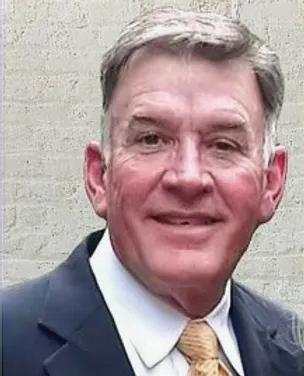


Arapahoe County Commission District 3: Brown vs Baker
Meet Scott Brown Scott Brown, a Democrat, grew up in Chambers Heights and attended Elkhart Elementary School and East Junior High School, according to his campaign website.
He played youth football for the Aurora Shamrocks and Cardinals and spent time at Hoffman Park. His family later moved to Heather Ridge, where he learned to golf and attended Smoky Hill High School, eventually meeting his future wife.
Brown and his wife bought their first home in Aurora before settling in Green Valley Ranch. They eventually returned to Arapahoe County in 1993, where they still reside and raised two sons, both graduates of Smoky Hill High School. Both sons also went into police work, which he said he takes great pride in.
Brown received an Airframe and Powerplant certificate from Emily Griffith Opportunity School and began his aviation career at Frontier Airlines, later moving to United Airlines in 1985.
He emphasizes Arapahoe County’s growth and changes, recognizing both opportunities for revitalization and overlooked areas.
Meet Jeff Baker
Incumbent Jeff Baker, a Republican, is serving his second term as Arapahoe County Commissioner. He represents District 3 and participates in numerous boards and committees focused on community development and public safety.
Baker is a native Coloradan, the youngest of four, raised in south-central Denver, and married since 1980 to Yangson Baker, a social worker, according to his campaign website.
He and his family have lived in Arapahoe County since 1994, raising two children, Maggie and Timothy, who are now adults and reside in the Denver Metro area. Timothy is a U.S. Army veteran, and Baker takes pride in his service, especially regarding veteran healthcare issues. Maggie is a college student and mother, making Baker a proud grandfather of Helena, who is active in marching band.
Since 1993, Yangson and Jeff have been active members of Young-Nak Presbyterian Church, where he serves as a Deacon overseeing youth ministry.
A retired chief warrant officer, Baker formerly led criminal investigations related to child abuse. After military service, Baker worked with the Aurora Police Department and spent 18 years in various roles with Arapahoe County.
County Commissioner District 3 makes up most of the eastern part of Arapahoe County. The district starts at Buckley Road in the center of the county, with a few spots that start further east.
The northern part of Arapahoe County starts east of outh. Piccadilly Road, and the southern part starts east of Parker Road.
Scott Brown and incumbent Jeff Baker, are competing for the position of County Commissioner in District 3. Each offers contrasting visions for the county’s future.
Here’s how each candidate promises to address the challenges and opportunities facing the county, according to their responses to our questions.
Brown, a Democrat, emphasizes the need for local roots and community revitalization for residents eager for change and a fresh perspective in solving existing problems. In contrast, Baker, a Republican, cites his experience and established leadership to
highlight his commitment to continuity, effective governance and expertise in navigating the county’s challenges.
Baker emphasizes a technical, policy-driven approach, focusing on external funding and long-term decision-making, while Brown takes a personal, practical stance, addressing everyday concerns like affordable housing and access to food and medical services. He says he relates directly to senior citizens’ needs without engaging broader regional or institutional frameworks like Baker recommends.
When it comes to Baker’s institutional knowledge, Brown states concerns with Baker’s financial management and says there’s a lack of resolve for solving budgetary issues and infrastructure concerns. Baker said voters should focus on his extensive experience in Arapahoe County, and emphasizes his long-term involvement in county operations.
On a topic like homelessness, Baker responses are project-driven, emphasizing specific county-led initiatives and regional partnerships, whereas Brown is people-driven highlighting the need for varied housing options and services.
While Brown offers what he says is a fresh perspective, advocating for change and practical solutions to ongoing problems, Baker stands by his track record of experience and his ability to navigate the complexities of county operations. Overall their approaches reflect that Brown is people-driven, concentrating on immediate needs like housing and services, while Baker is project-driven, focusing on policy, funding, and regional cooperation.
—CassandraBallard, SentinelStaffWriter


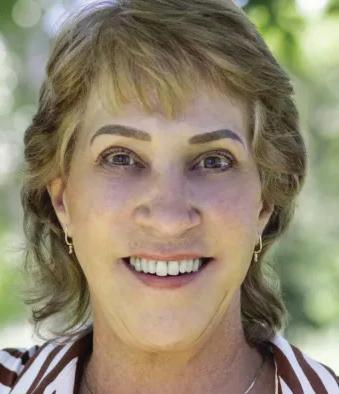
JULIE DURAN MULLICA SHELLY MCCLURE
Meet Julie Duran
Julie Duran Mullica, a Democrat, has experience serving Adams County through Northglenn City Council and as co-chair to the Tri-County Board of Health, according to her campaign website.
The mother of three said she aims to address community issues like attainable housing, smart growth and public health. She wants to prioritize tackling the regional housing crisis by advocating for affordable housing solutions for families, seniors and young adults.
Mullica also wants to focus on the importance of smart growth, balancing economic opportunities with infrastructure and water management to ensure the county’s development benefits both businesses and working-class families.
With a background in public health, she said she is excited to support the new Adams County Public Health Department in addressing health disparities, focusing on diabetes, asthma, reproductive health and air quality. Her vision is to create a healthy, vibrant, thriving community for future generations.
Meet Shelly McClure
Shelly McClure, a Republican, describes herself as a wife, mother, grandmother and woman of faith, focused on family, education and business.
As a fourth-generation Coloradan and long-time Thornton resident, she emphasizes community. Having cared for her elderly parents and raised her family, she emphasizes the importance of service and hard work, according to her campaign website.
McClure has a background in education and owns her own business. Her goals include reducing property
taxes, strengthening the economy and ensuring fiscal responsibility in infrastructure maintenance.
She supports law enforcement and first responders and advocates medical freedom, which means believing in no medical mandates. McClure plans to prioritize local business growth, park preservation and senior care. She also plans to address county challenges by advocating for free and fair elections and responsibly managing natural resources.
The race for Adams County Commissioner District 1 offers voters a decision between two candidates to replace Eva Henry: Democrat Julie Duran Mullica and Republican Shelly McClure.
District 1 is in the western part of Adams County, taking up a small area between 88th Avenue and 120th Avenue and Huron Street and Colorado Boulevard, with a small pocket that reaches east to Quebec Street and a small area that reaches west to Sheridan Boulevard.
All Adams County residents vote for District 1 County Commissioners.
Mullica has focused her campaign on affordable housing, public health and smart growth, aiming to balance economic development with infrastructure and family needs.
Her opponent, Shelly McClure, prioritizes reducing taxes, supporting law enforcement and promoting fiscal responsibility, with a focus on local business growth, senior care and preserving community values.
As voters prepare to make their choice, they must weigh Mullica’s institutional knowledge and focus on housing, science and health against McClure’s personal knowledge in education and business and focus on fiscal responsibility, community support and economic growth.
Mullica is married to State Senator Kyle Mullica, who represents Thornton and Northglenn through Federal Heights in Senate District 24.
—CassandraBallard, SentinelStaffWriter



Adams CountyCommission District 5: Baca vs Wood
Meet Lynn Baca
Incumbent Lynn Baca, County Commissioner for District 5 in Adams County, is a second-generation resident with deep roots in the area’s agricultural community, according to her campaign website.
Growing up in Brighton, the Democrat cherishes the county’s history while striving to help it grow into a modern, thriving economy where everyone feels welcomed. Her family has worked in agriculture for over 100 years, instilling a commitment to service.
Baca’s road to public service began 20 years ago during her battle with ovarian cancer, causing her to volunteer and eventually serve in local government, including roles like Brighton City Council and regional committees. As commissioner, she prioritizes improving the community’s quality of life, raising wages, creating affordable housing and protecting the environment. She emphasizes preserving Adams County’s heritage while fostering growth and inclusivity.
Meet Jim Wood
Jim Wood grew up with humble beginnings and a self-made mentality, he said.
The Republican grew up in agricultural California, and his young parents, Jim and Debbie, inspired him with their hard work and determination.
Due to his mother’s hotel career,
his family moved often. Wood traveled from Morro Bay to San Diego, Kauai and South Lake Tahoe. At age 12, his parents divorced, and he moved in with his grandparents in Tipton, CA, where, according to his campaign website, he learned the values of hard work, honesty and family.
Wood’s grandfather, a farm products salesman, became his role model, instilling his lifelong principles, his website states. Inspired by his grandfather, he joined the Navy at 18 and served in aircraft maintenance during Operation Iraqi Freedom.
After his service, he worked in fabrication before finding success in street-rod building and hemp processing, generating significant revenue. Now settled in Colorado with his wife, Mallery, he manages a business and aims to promote sustainable agriculture while serving the community in Adams County.
In the race for Adams County Commissioner in District 5, incumbent Democrat Lynn Baca competes with local business owner Jim Wood, a Republican, bringing different backgrounds and visions for the county’s future.
District 5 makes up the easternmost part of Adams County. It surrounds Denver International Airport and starts slightly west of Brighton Boulevard. Denver County runs the area around the airport, and the Rocky Mountain Arsenal space is in District 2 of Adams County.
All county residents vote for District 2 County Commissioners.
As a Democrat, Baca emphasizes inclusivity and progressive growth for Adams County. Her priorities include improving quality of life, raising wages, creating affordable housing and environmental protection. Baca wants to balance the preservation of the county’s heritage with the need for modernization.
Representing the Republican perspective, Wood promotes a self-reliant approach, emphasizing sustainable agriculture and community service. His business background suggests a focus on economic development, leveraging his experience in entrepreneurship to enhance the local economy.
Lynn Baca’s deep roots in the community and focus on inclusivity contrast with Jim Wood’s entrepreneurial spirit and emphasis on self-reliance. Voters must consider their priorities—whether they lean towards Baca’s progressive, community-oriented approach or Wood’s business-minded, sustainable practices—as they decide.
—CassandraBallard, SentinelStaffWriter
Aurora’s Pit bull ban back on the ballot
Voters will decide, again, whether Aurora should ban pit bull dogs from the city, resurrecting a controversy that has hounded the community for almost 20 years.
The pit bull ban in Aurora was initially enacted in 2005 with some leniency for people the city had previously issued a license. In 2014, voters approved a referendum to keep the ban. In 2021, however, Aurora City Council approved the removal of dog breed restrictions from the city ordinance — without going back to voters for permission.
Later in 2021, Aurora resident Matthew Snider sued the Aurora City Council over the vote because it did not include voter support. He argued that the council broke city charter language and that Aurora voters decided the issue, and must decide any changes. By 2023, the Colorado Court of Appeals ruled in favor of Snider.
So, Aurora lawmakers are asking voters whether the city should repeal the restricted breed ban and allow residents to own American Pit Bull Terriers, American Staffordshire Terriers and Staffordshire Bull Terriers.
Here’s what you need to know about the pit bull ban ballot question.
What does a YES vote mean?
Yes, you want to allow people to own pit bulls in Aurora. You support repealing the breed ban and allowing residents to own American Pit Bull Terriers, American Staffordshire Terriers, and Staffordshire Bull Terriers within the city limits of Aurora.
What does a NO vote mean?
No, you do not want to allow pit bulls in Aurora. You support maintaining the breed ban that prevents residents from owning American Pit Bull Terriers, American Staffordshire Terriers, and Staffordshire Bull Terriers within the city limits of Aurora.
Veterinarian stance
“We had a big moment of panic when we saw that the repeal had been overturned because we do see a big difference when we have breed-specific legislation on the books,” said Senior Director of Advocacy and Education at the Dumb Friends League Ali Mickelson, “but they are not enforcing that ban right now. So we haven’t felt that yet, but we are preparing for it.”
She said that when there is a breed-specific ban, there is an influx of the banned breed brought to the shelter, and it is very challenging to find them new homes.
Many shelters are usually already at maximum capacity, so having a breed-specific ban overwhelms shelters with finding placement for them. Mickelson said that many shelters are moving away from destroying unwanted dogs, and Colorado shelters have an strong network for moving animals.
When there was a pit-bull ban in Denver, and Aurora was fully implementing its breed-specific ban, the shelter would have to label the kennels, warning people that they might live in a place with a ban on that breed.
“We have these families that come in, and they’re so excited to find out more about a dog, and then they find out that they can’t adopt that dog because of the restrictions in their community,” Mickelson said. “It just results in us having dogs that stay longer.”
Denver Dumb Friends League sits at the border of Aurora and Denver. When there was a ban in both cities, Mickelson said they had difficulty finding homes for those breeds.
“When those two communities had those bans, that just really, really limited our doctors for those breeds,” she said.
Missing data
Mickelson said finding usable data from the Denver Dumb Friends League involving Denver’s breed-specific ban was unreliable because the ban coincided with COVID-19 lockdowns.
“People were adopting more and relinquishing less, and so it’s not a great sample size, but I can definitely
speak about it generally,” Mickelson said.
Mickelson said it can be hard to distinguish whether a dog is a pit bull which seems to be a common finding nationally.
“You know, we’re not DNA testing any of these animals,” she said. ““This is one of the big conversations nationally, and why breed-specific legislation is being overturned, and is really not very popular with most animal welfare organizations is because it’s really hard to tell by looking at a dog.”
Even dogs with a portion of pit bull could be considered under the ban, and it is hard for veterinarians to distinguish whether a dog had a half or a quarter pit bull in them.
“That’s another weird data skew,” Mickelson said.
Most dog-bite data comes from plastic surgery data or police records. If pit bulls are hard to distinguish for vets, police officers or victims of a dog attack might not accurately determine the breed that attacked them.
Lori R Kogan, a Ph.D. psychologist and professor of clinical sciences at Colorado State University, found the same problem in her study.
She said most veterinarians she talked to in her study could not distinguish a pit bull. Kogan also found that public education about animal welfare and animal behavior was a more supported alternative than breed-specific bans.
“That’s one of the reasons doing specific legislation is not a great way to protect people from dangerous dogs,” Mickelson said.
Mickelson also added that when there is a ban, dog owners of that breed are less likely to get the resources they might need, like behavioral training or shoots and health checkups.
The science and the myths
There is no such thing as a pit bull “lockjaw,” where supposedly pit bulls bite and lock their jaw when attacking, Colorado veterinarians and researchers agree.
Pit bull is not a breed. It’s a catchall term. There are American Pit Bull Terriers, American Staffordshire Terriers and Staffordshire Bull Terriers that are all included in the Aurora breed-specific ban.
Pit bulls are difficult to distinguish, according to many veterinary professionals.
Aggressive dog behavior is more about the dog’s treatment and training than the breed.
Studies have also found that physical traits of a dog have little effect on their personality.
“Dog breed is generally a poor predictor of individual behavior and should not be used to inform decisions relating to selection of a pet dog,” according to an article published in Sci-
ence journal in 2022, called ‘Ancestry-inclusive dog genomics challenges popular breed stereotypes’.
Pit bulls were not always the main culprit of lousy press; Bloodhounds, Dobermans, Rottweilers and German Shepherds have all had bans during different periods in the United States.
In the early 20th Century, pit bulls were celebrated as “America’s Dog,” and featured in military recruitment posters. However, perceptions shifted in the 1980s, linking them to gangs and drug culture. Linder states that pit bulls became symbols of criminality, particularly during the War on Drugs. The 2007 Michael Vick dog-fighting case further entrenched these associations, raising concerns that breed-specific laws aim to marginalize Black communities.
“This Article examines the relationship between pit bulls and people of color, incorporating new research to argue that these laws may be rooted in racial bias. In such instances, breed-specific bans function as a means of keeping minorities out of majority-white neighborhoods,” Linder said.
Another study from Denver University, ‘A Quantitative Study of Denver’s Breed-Specific Legislation’ published in 2020 found that the enforcement of the city’s pit bull ban was primarily focused in racially diverse neighborhoods. Additionally, despite the city investing $100 million over 30 years in enforcement, there was no significant effect on public safety.
A DU-published feature summarizes the 2020 study where Kevin Morris, American Humane endowed chair and research associate professor explains that the most “stunning” finding was the unequal enforcement of the pit bull ban in the city’s most vulnerable areas, especially where “racially diverse communities intersect with predominantly white neighborhoods,” as the study notes.
“The enforcement of BSL has taken place primarily in our communities of color in Denver,” Morris says. “And this criminalization of certain pet owners has exacerbated the barriers they already experience to accessing pet support services.”
Alternative Solutions
Research from all of the studies listed indicate that better alternatives to breed-specific bans include stronger enforcement of animal cruelty laws, public education about animal welfare and animal behavior, and stricter leash laws.
“We really find that the most effective thing with dangerous dogs is to treat dogs and owners as individuals, because any dog can bite, any breed of dog can bite, any owner can raise a dog to bite.” Mickleson said.
—CassandraBallard, SentinelStaffWriter
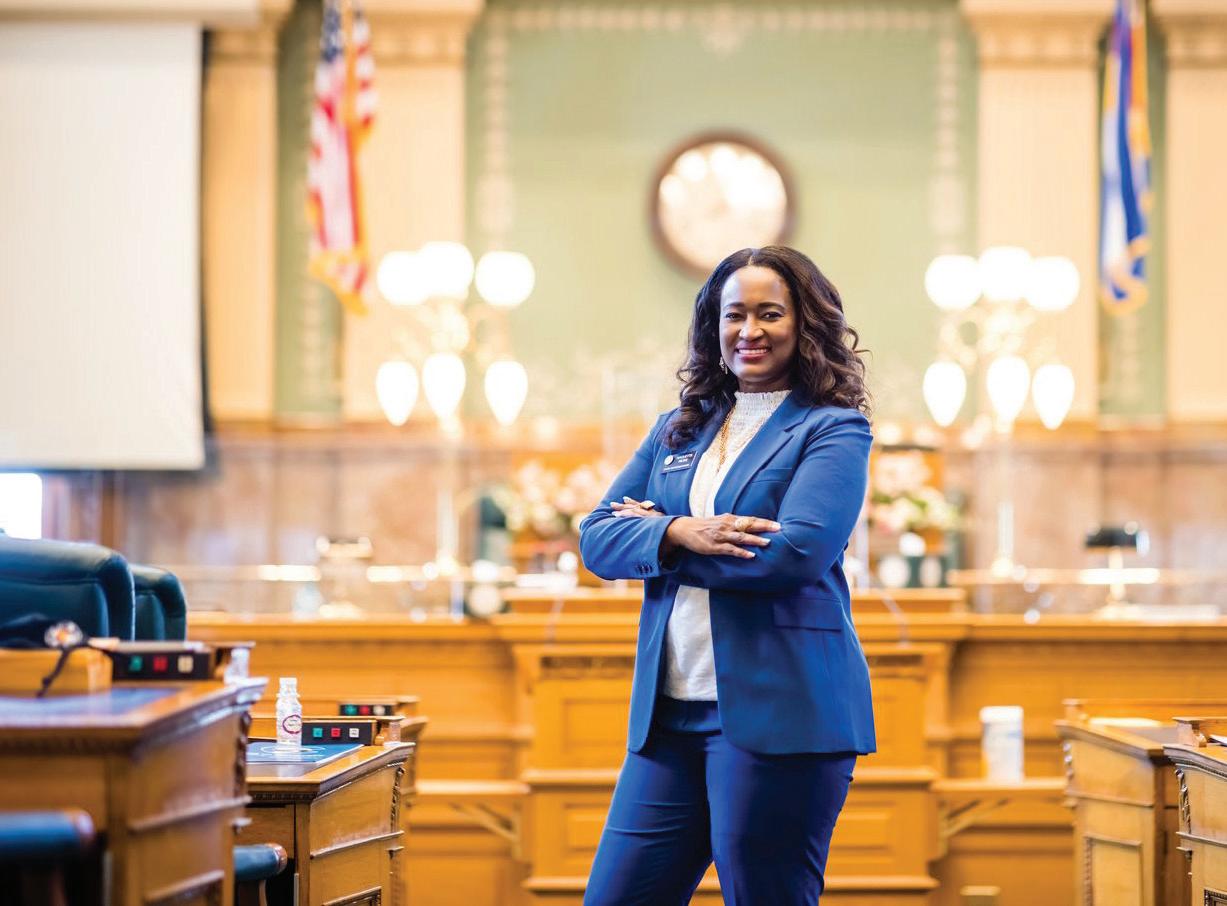



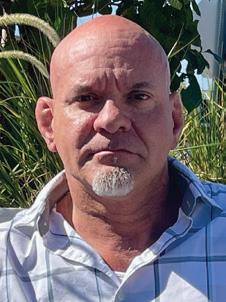

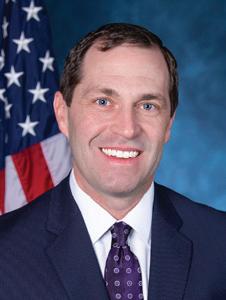
JOHN FABBRICATORE JASON CROW
Meet John Fabbricatore
John Fabbricatore is a 52-year-old retired ICE field office director who has lived in Aurora since 1997. He is married with two children — a 14-year-old daughter and a 29-year-old son. He also has a 6-month old grandson.
The New York City native was born in Brooklyn and raised in Queens where he was educated in Catholic schools and says he was elected senior class president. He enlisted in the Air Force, where he served as the security forces, then worked for the Federal Protective Service and ICE (previously the Immigration and Naturalization Service) until his retirement as field office director in 2022.
He racked up some community college credits while in the Air Force, but earned his associate’s degree in organizational leadership online through Trident University during COVID. He says he is “still working on his bachelor’s” degree.
Meet Jason Crow
Jason Crow, 45, was elected to represent Colorado’s 6th Congressional District in 2018 after having worked as a private lawyer who volunteered his time for free representing veterans.
Crow enlisted in the National Guard and worked construction to help pay his way through college at the University of Wisconsin–Madison. He went on to join the active-duty Army and served in the Army’s 82nd Airborne Division and in the elite 75th Ranger Regiment, deploying to both Iraq and Afghanistan and rising to the rank of captain.
In Congress, he serves on the House Permanent Select Committee on Intelligence and House Foreign Affairs Committee, on which he is the Ranking Democrat of the Oversight and Accountability Subcommittee.
Crow received his law degree at the University of Denver. He and his former wife have two children attending local schools.
John Fabbricatore remembers when he met Jason Crow.
It was 2019, Crow’s first year in Congress, and Fabbricatore at that time led the U.S. Immigration and Customs Enforcement (ICE) field office in Colorado. Responding to complaints about unsafe and dehumanizing conditions, Crow was pushing for transparency and accountability in the privately run GEO detention center in Aurora where ICE imprisons hundreds of undocumented immigrants.
“He showed up right away trying to shut the place down,” Fabbricatore recalls. “I didn’t agree with that and didn’t think he understood what was going on at a time when we had 87% criminal aliens in detention there. I remember thinking we need someone in that seat who actually knows what he’s talking about.”
Fabbricatore resigned from ICE three years later because he says he
was “aggravated with the Biden administration and how they were dealing with the border situation.” But he decided two years into his retirement to seek the Republican nomination for Crow’s 6th Congressional District seat because he figured that he had “given up maybe a little bit too soon on trying to handle the border and help with national security.”
Colorado’s 6th Congressional District encompasses much of the eastern part of the Denver metropolitan area, including portions of Centennial and Littleton, and all of Aurora.
Fabbricatore, a 52-year-old native New Yorker, has made immigration his main campaign issue in a year when the city — where he has lived since 1997 — has snagged national and even international headlines for its recent influx of Venezuelan migrants. His has been among the loudest voices this election season warning about the presence of a Venezuelan prison gang called Tren de Aragua, also known as TdA in the city.
Police have arrested 8 of the 10 people they say they have linked so far to the group, insisting it is not a major safety threat to the city.
Although Fabbricatore has made breathless warnings about the gang to other news outlets, he told the Sentinel he has been careful not to over exaggerate TdA’s activities in Aurora or say it has taken over the city, as Aurora Councilmember Danielle Jurinski has at times claimed, only to be paroted by politicians ranging from Aurora Mayor Mike Coffman to former President Donald Trump. Still, he says the gang needs to be eradicated before its membership grows in Aurora.
“I think it’s important that people see the truth, because the truth is scary enough. You don’t have to over-inflate numbers, and you don’t have to say that the Aurora is burning to make people realize that there is” a threat posed by TdA, he said.
Fabbricatore recently wrote and self-published a book called “De-Iced” about what he describes as “currently out-of-control open border conditions.” The book makes a case that sanctuary cities such as Denver that have made a policy of not harassing undocumented immigrants have pushed immigrant-related problems to lower-rent and lower-income suburbs such as Aurora without the resources to handle them. Aurora Police Department had a shortage of 68 officers as of this posting.
His book addresses fentanyl distribution and impediments to apprehending child predators and human traffickers. It also details Fabbricatore’s experience in 2019 as a target of the Abolish ICE movement. He says he was singled out by dozens of anti-ICE demonstrators who distributed leaflets in his neighborhood claiming that he was in charge of a “concentration camp,” referring to the privately-owned GEO ICE detention center in Aurora that Crow has wanted to shutter.
“I received death threats, and one person was arrested in Colorado Springs and convicted of making those threats against me and my agents,” Fabbricatore wrote. “This was a difficult and traumatic experience for my family, as my job was my responsibility, but they were being targeted for it.”
The political newcomer acknowledges he is the underdog in a race against a popular congressman who has won the district by wide margins since first elected in 2018. “Being a voice for what I believe in, and for what other people tell me they want” is just
as important as actually beating Crow, he said.
Fabbricatore criticizes Crow for not seeming to know, or at least care, that some ICE detainees are violent criminals whom Fabbricatore describes as “rapists and murderers” and says should not be released back on the streets. He derides the congressman for going against the Laken Riley Act, a House bill aimed at equipping ICE and state governments with enhanced tools to combat crime by people who have entered the country illegally.
“Looking at what Jason Crow wants to happen with immigration and other things that he’s voted on, I just felt like I wanted to be the one to run against him in this election cycle,” he said.
Fabbricatore opposes abortion rights except in cases of rape or incest, but says his personal views do not lead him to question state laws allowing abortion, like in Colorado. He supports gun owners’ rights, but wants prosecutors to crack down on illegal firearms possession. He favors making green energy more efficient and cost-effective, and wants to explore the possibility of developing micro-reactors throughout the country to produce nuclear power.
Though he has allied himself with far-right figures such as U.S. Reps. Lauren Boebert of Colorado and Chip Roy of Texas, Fabbricatore said he takes umbrage when people assume he supports Donald Trump whose “theatrics,” as he describes the former president’s bombast, sometimes make him cringe. That said, the assumption isn’t off-base. Fabbricatore does in fact back Trump, whom he says he admires for having won the presidency without a traditional political background and whose end to longtime federal “catch and release” policy toward undocumented immigrants he wants to see more of.
He notes that he “did not agree with what happened” on Jan 6, 2021, the day of the pro-Trump insurrection at the U.S. Capitol. Still, he blames then-House Speaker Nancy Pelosi and District of Columbia Mayor Muriel Bowser — not Trump — for “allowing it all to happen.”
Fabbricatore, like Trump, is a native New Yorker, having been raised in Brooklyn and Queens, educated mostly in Catholic schools, and served, he said, as his senior class president. Also like Trump, he is a loud talker, turning heads in a café late last month when being interviewed for this story.
He spoke proudly of his 30-year career in federal law enforcement, which he started in the U.S. Air Force security forces. He then went to work with the Federal Protective Service, and later for the Immigration and Naturalization Service (now known as ICE).
He is a principal in a California-based company called The Complete Solution Group, which provides consulting services on immigration, firearms and self-defense products to clients he refused to name, citing their non-disclosure agreements. If elected, he said he would divest from the company.
Fabbricatore’s home in Aurora has been drawn out of the 6th Congressional District and sits now within the 4th Congressional District, where Boebert is running. Federal law doesn’t require congressional candidates to live in their districts, and nobody has made much of an issue of it regarding Fabbricatore, especially because his home is merely feet away from the district line.
Crow, for his part, has since tak-
ing office in 2019 served through two impeachments, a pandemic and an insurrection. In 2020, he was appointed as an impeachment manager for Trump’s first impeachment.
“It’s been a wild ride, to say the least, the last five and a half years,” he said Monday in a conversation with the Sentinel.
The Democratic incumbent spoke with frustration about Republicans’ “failed leadership,” making this “one of the least productive congresses in history.”
“We spent weeks, weeks of legislative taxpayer time while the Republicans tried to choose a new speaker and ousted the old one because of personal grievances,” he said. “And then, you know, you have people who just are not serious people, not serious legislators, who are there for, you know, personal fame, personal gain, to get attention. It makes it very hard.”
Crow, 45, sees this summer’s controversy about TdA gang members allegedly overrunning Aurora as an increasingly-used Republican tactic trying to force Democrats to spend their “time and oxygen responding to lies and misinformation.”
“It was so obviously a lie and so obviously not consistent with reality on the ground and what we knew the situation to be,” he said. “There was an initial reaction of I’m not going to give this a platform or the oxygen it doesn’t deserve and, you know, fan the flames. But when it became apparent that it had already taken root and was spreading in the way that it was, then, obviously, I was compelled to respond.”
Crow acknowledges that more needs to be done to address the influx of about 40,000 Venezuelans to Colorado over the last few years. About 15,000 are living in his district. He points to the irony that Trump and fellow Republicans are raising the issue as an election-season crisis when, as he tells it, they could have averted much of that crisis by embracing a recent bipartisan border deal.
“That deal was tanked by Donald Trump because he’d rather run on the problem than solve the problem,” he said, noting that deal would have allowed the feds to hire more border control officers, add more technology to secure the southern border and address a backlog of asylum seekers.
Crow hopes for enough Democratic wins in November to “reinvigorate that deal.”
In the meantime, he said he has ten staffers in his Aurora office working as caseworkers to help immigrants and asylum seekers navigate the immigration system as well as find housing, jobs and services. He said he will continue to seek Federal Emergency Management Agency (FEMA) and other federal funding to help state, county and city governments, and nonprofits, serve immigrant communities. And, he added, “I will continue to be their voice. I will speak out, and I will represent them publicly and continue to talk about their plight,” he said of immigrants living in his district.
That plight, he noted, includes conditions in ICE’s detention center in Aurora, which continues to be run by the privately-owned GEO Group.
Crow said he is proud of having passed a law providing more federal oversight, including by members of Congress, into it and other privately run detention centers. Still, more than five years after facing down Fabbricatore about an array of health, safety and civil rights problems immigrants faced at the GEO prison in Aurora, he
still aims to push legislation stopping private companies from running federally funded immigrant detention centers — or any prisons, for that matter.
“Fundamentally, when you add a profit motivation into the detention of human beings, you create a perverse incentive to cut corners that result in abuses,” he said.
Crow, a former Army Ranger and Bronze Star recipient, serves on the House Permanent Select Committee on Intelligence and the House Foreign Affairs Committee. He had harsh words for Israeli Prime Minister Benjamin Netanyahu, saying he doesn’t believe he is serving the best interests of Israel nor the Israeli people.
“I have long said that his actions indicate that he’s not interested in trying to find a resolution to this conflict,” he said. Until that resolution involves two states where Jews and Palestinian “can feel safe and have a right to exist,” he added, “I don’t see how any of this changes.”
Crow, along with U.S. Rep Chris Deluzio of Pennsylvania, wrote a letter signed by 86 federal lawmakers last year condemning Hamas’ October 2023 attack on Israel while also raising concerns about the Israeli government’s conduct, especially its restrictive policies on humanitarian assistance in Gaza. Those restrictions call into question assurances Netanyahu has made to the U.S., they wrote, urging the Biden administration to consider an array of possible responses, including withholding certain military aid to Israel. So far, the Biden administration has not done so.
Crow expressed concerns about Israel’s more recent attacks in the West Bank and Lebanon, and its threats to retaliate against Iran for its missile strike on Israel in early October.
“I’m very worried about escalation. Ultimately, you just are not going to solve this. You cannot bomb away this problem, and that is what they appear to be trying to do,” he said of Israel.
“You know, we have to be very careful that, when we’re providing aid and support, we do so consistent with our values and our reputation.”
Closer to home, Crow touts that the current 3.2% inflation rate “is the lowest it’s been since 2021,” while also acknowledging that the cost of living is still too high. He lauded Congressional Democrats’ work trying to ease prices by solving a workforce shortage partly through immigration reform; continuing to address supply chain disruptions that crept up during COVID; and passing laws that regulate price gouging.
“There’s legislative proposals that I’m co-sponsoring that would further crack down on it that remain difficult to get passed under this current Congress,” he said.
Crow supports ethics reforms for the U.S. Supreme Court. He also is open to considering other reforms such as term limits or expanding the number of justices.
“I think this Court has been radically out of line with not only the historic role of the court and the role of precedent, but also the values of Americans on almost every issue, from abortion to common-sense gun violence prevention to environmental regulation to rolling back Chevron deference and the role of regulation and rulemaking. The lives of everyday Americans, they have gutted extremely important protections for Americans that I think we’re only just beginning to see some of the major consequences of.”
—SusanGreene, SentinelReporterinResidence
NOTICE OF PUBLIC HEARING ON THE PROPOSED 2025 BUDGET AND NOTICE OF PUBLIC HEARING ON THE AMENDED 2024 BUDGET
The Board of Directors (the “Board”) of the BLACKSTONE METROPOLITAN
DISTRICT (the “District”), will hold a public hearing at 7777 South Country Club Parkway, Aurora, Colorado and via teleconference on October 22nd, 2024, at 6:00 p.m., to consider adoption of the District’s proposed 2025 budget (the “Proposed Budget”), and, if necessary, adoption of an amendment to the 2024 budget (the “Amended Budget”). The public hearing may be joined using the following teleconference information: https://us06web.zoom. us/j/2436451038?pwd=dTnF79Jr21dDo7QYamnGC5m9FL4wVS.1&omn=82423182990
Meeting ID: 243 645 1038 Passcode: BMD7777 Call-in Number: +1-719-359-4580 The Proposed Budget and Amended Budget, if necessary, are available for inspection by the public at the offices of CliftonLarsonAllen, LLP, 8390 East Crescent Parkway, Suite 300, Greenwood Village, CO 80111. Any interested elector of the District may file any objections to the Proposed Budget and Amended Budget at any time prior to the final adoption of the Proposed Budget or the Amended Budget by the Board. The agenda for any meeting may be obtained at https://www.blackstonemetro.org/ or by calling (303) 858-1800. BY ORDER OF THE BOARD
35 days after the date of the last publication, judgment by default may be rendered against you by the court for the relief demanded in the complaint without further notice.
This is an action: seeking to in- validate the Notice of Intent to Lien, Notice to Extend Time to File Me- chanic’s Lien, and the Mechanic’s Lien that Defendants recorded in the Arapahoe County Clerk & Re- corder’s Office on March 26, 2024, as Reception Nos. E4017481 and E4017482.
First Publication: September 12, 2024
Last Publication: September 10, 2024
Sentinel PUBLIC NOTICE OF CONTRACTOR’S FINAL SETTLEMENT
Directors of the Green Valley Ranch East Metropolitan District No. 11 c/o Icenogle Seaver Pogue, P.C., 4725 South Monaco Street, Suite 360, Denver, Colorado 80237. BY ORDER OF THE BOARD OF DIRECTORS: Green Valley Ranch East Metropolitan District No. 11 By: /s/ Icenogle Seaver Pogue A Professional Corporation
Publication: October 10, 2024 Sentinel
NOTICE TO PROPOSED 2025 BUDGET AND AMENDMENT OF 2024 BUDGET GARDENS AT EAST ILIFF METROPOLITAN DISTRICT ARAPAHOE COUNTY, COLORADO
EDWARD BYRNE MEMORIAL JUSTICE ASSISTANCE GRANT FUNDS FROM THE U.S. DEPARTMENT OF JUSTICE.
A PUBLIC HEARING IS REQUIRED PRIOR TO THE OBLIGATION AND EXPENDITURE OF ANY OF THE GRANT FUNDS RECEIVED, TOTALING $291,549. THIS IS A JOINT GRANT APPLICATION BETWEEN THE ARAPAHOE COUNTY SHERIFF’S OFFICE AND THE AURORA POLICE DEPARTMENT.
THE HEARING WILL BE CONDUCTED
NOTICE IS HEREBY GIVEN, pursuant to Sections 29-1-108 and 109, C.R.S., that a proposed budget has been submitted to the Board of Directors of the Gardens at East Iliff Metropolitan District (the “District”) for the ensuing year of 2025. The necessity may also arise for the amendment of the 2024 budget of the District. Copies of the proposed 2025 budget and 2024 amended budget (if appropriate) are on file in the office of the District’s Accountant, CliftonLarsonAllen LLP, 8390 East Crescent Parkway, Suite 300, Greenwood Village. Colorado 80111, where same are available for public inspection. Such proposed 2025 budget and 2024 amended budget will be considered at a regular meeting to be held on October 15, 2024 at 11:00 a.m. via video/teleconference. Any interested elector within the District may, at any time prior to the final adoption of the 2025 budget or the 2024 amended budget, inspect the 2025 budget and the 2024 amended budget and file or register any objections thereto. You can attend the meeting in any of the following ways:
1. To attend via videoconference, e-mail cwill@specialdistrictlaw.com to obtain a link to the videoconference.
2. To attend via telephone, dial 1-720-5475281, and enter the following additional information: Conference ID: 595 267 969# GARDENS AT EAST ILIFF METROPOLITAN DISTRICT McGeady Becher Cortese Williams P.C. Attorneys for the District Publication: October 10, 2024 Sentinel
PUBLIC NOTICE SUMMONS BY PUBLICATION Case Number: 24CV31264 Courtroom: 204
ARAPAHOE COUNTY COMBINED COURTS DISTRICT COURT, ARAPAHOE COUNTY, COLO- RADO, 7325 S Potomac St. #100, Centennial, CO 80112
Plaintiff: Dan’s Custom Construction, Inc., a Colorado corporation, v. Defendants: Eric W. Hoaglund, an individual, and The Eric Hoa- glund Painting Co., a Colorado corporation.
The People of the State of Colorado to Eric W. Hoaglund, an individual, and The Eric Hoaglund Painting Co., a Colorado corporation.; Attor- ney for Plaintiff: James A. McDaniel, CHIPMAN GLASSER, LLC 2000 S. Colorado Blvd., Tower One, Suite 7500, Denver, CO 80222 Phone: (303) 578-5780 jmcdaniel@chip- manglasser.com
You are hereby summoned and re- quired to appear and defend against the claims of the complaint filed with the court in this action, by filing with the clerk of this court an answer or other response. You are required to file your answer or other response within 35 days after the service of this summons upon you. Service of this summons shall be complete on the day of the last publication. A copy of the complaint may be ob- tained from the clerk of the court.
If you fail to file your answer or other response to the complaint in writing within
Pursuant to 1973 C.R.S. 38-26-107, notice is hereby given that on/or after the 24th day of October, 2024, final settlement with M. A. Meyer Construction, will be made by the Joint District No. 28J of the Counties of Adams and Arapahoe (Aurora Public Schools) for and on account of the General Construction Contract for APS District Laundry Facilities Additions Project #333324, and that any person, co-partnership, association, company, or corporation who has an unpaid claim against any of the contractors for or on account of the furnishing of labor, materials, team hire, sustenance, provisions, provender, or other supplies used or consumed by such contractors, or any of their subcontractors, in or about the performance of said work may file at any time up to and including said time of such final settlement on/or after,24th October, 2024, a verified statement of the amount due and unpaid on account of such claim with the Board of Education of said school district at the office of:
Support Services Aurora Public Schools 15701 E. 1st Avenue Aurora, CO 80011
Failure on the part of a claimant to file such statements prior to such final settlement will relieve said school district from all and any liability for such claimant’s claim.
JOINT DISTRICT NO. 28J OF THE COUNTIES OF ADAMS AND ARAPAHOE STATE OF COLORADO
First Publication: October 10th, 2024
Final Publication: October 17th, 2024
PUBLIC NOTICE OF CONTRACTOR’S FINAL SETTLEMENT
Pursuant to 1973 C.R.S. 38-26-107, notice is hereby given that on/or after the 24th day of October, 2024, final settlement with Krische Construction Inc (KCI) , will be made by the Joint District No. 28J of the Counties of Adams and Arapahoe (Aurora Public Schools) for and on account of the General Construction Contract for the Dalton Elementary School, Ceiling/Lighting Replacement project (Bid# 3316-23), and that any person, co-partnership, association, company, or corporation who has an unpaid claim against any of the contractors for or on account of the furnishing of labor, materials, team hire, sustenance, provisions, provender, or other supplies used or consumed by such contractors, or any of their subcontractors, in or about the performance of said work may file at any time up to and including said time of such final settlement on/ or after, October 24, 2024, a verified statement of the amount due and unpaid on account of such claim with the Board of Education of said school district at the office of:
Division of Operations Aurora Public Schools 15701 E. 1st Avenue Aurora, CO 80011
Failure on the part of a claimant to file such statements prior to such final settlement will relieve said school district from all and any liability for such claimant’s claim.
JOINT DISTRICT NO. 28J OF THE COUNTIES OF ADAMS AND ARAPAHOE STATE OF COLORADO
First Publication: October 3, 2024 Final Publication: October 10, 2024 Sentinel SKY DANCE METROPOLITAN DISTRICT NOS. 1 AND 2 NOTICE CONCERNING 2024 BUDGET AMENDMENTS AND PROPOSED 2025 BUDGETS
NOTICE IS HEREBY GIVEN to all interested parties that the necessity has arisen to amend the 2024 Budgets of Sky Dance Metropolitan District Nos. 1 and 2, and that proposed 2025 Budgets have been submitted to the Boards of Directors of the Sky Dance Metropolitan District Nos. 1 and 2. Copies of the proposed Amended 2024 Budgets and 2025 Budgets have been filed at the Districts’ offices, 141 Union Boulevard, Suite 150, Lakewood, Colorado 80228, where the same are available for public inspection; and that adoption of Resolutions Amending the 2024 Bud-

A strong community depends on access to trusted news. Please help us continue that mission with a donation.
gets and Adopting the 2025 Budgets will be considered at a public hearing of the Boards of Directors of the Districts to be held on Wednesday, October 16, 2024 at 10:30 a.m. at the offices of McGeady Becher Cortese Williams P.C., 450 E. 17th Avenue, Suite 400, Denver, Colorado 80203 and via video / teleconference (Zoom).
You can attend the meeting virtually using the following information: 1. To attend via Videoconference use the following link: https://us02web.zoom.us/j/5469119353?pwd=SmtlcHJETFhCQUZEcVBBOGZVU3Fqdz09
2. To attend via telephone, dial 1-719-3594580 and enter the following additional information: Meeting ID: 546 911 9353 Passcode: 912873
Any interested elector of the Districts may, at any time prior to the final adoption of the 2024 Amended Budgets or the 2025 Budgets, inspect the 2024 Amended Budgets or 2025 Budgets and file or register any objections thereto.
SKY DANCE METROPOLITAN DISTRICT NOS. 1 AND 2 By /s/ David Solin
Publication: October 10, 2024 Sentinel
Secretary
NOTICE TO CREDITORS BY PUBLICATION
PURSUANT TO §15-12-801, C.R.S. Case No. 2024PR31029
Estate of Dennis Gerald Leary aka Dennis G. Leary aka Dennis Leary, Deceased. All persons having claims against the above-named estate are required to present them to the Personal Representative or to the District Court of Arapahoe County, Colorado, on or before February 3, 2025, or the claims may be forever barred.
Timothy W. Leary
Personal Representative c/o Frank J. Danzo, III Atty Reg #: 26789
Chayet & Danzo, LLC
650 S. Cherry St., Ste. 710 Denver, CO 80246
Phone: 303-355-8500
First Publication: October 3, 2024
Final Publication: October 17, 2024 Sentinel
NOTICE TO CREDITORS BY PUBLICATION
PURSUANT TO §15-12-801, C.R.S. Case No. 2024PR136
Estate of Phillip Richard Coburn, Deceased.
All persons having claims against the above-named estate are required to present them to the Personal Representative or to the District Court of Arapahoe County, Colorado, on or before February 3, 2025, or the claims may be forever barred. Janie Suzanne Phillips Personal Representative 3365 S. Jericho Ct. Aurora, CO 80013
First Publication: October 3, 2024
Final Publication: October 17, 2024
Sentinel
NOTICE TO CREDITORS BY PUBLICATION
PURSUANT TO §15-12-801, C.R.S. Case No. 2024PR30422
Estate of John Joseph Rosko, Deceased.
All persons having claims against the above-named estate are required to present them to the Personal Representative or to the District Court of Adams County, Colorado, on or before January 27, 2025, or the claims may be forever barred. Monica Laubach Personal Representative 27605 Handle Road #6 Calhan, CO 80808
Attorney for Personal Representative
Benjamin Kinney
Atty Reg #: 45881
Kinney Law Office
390 Interlocken Crescent, Ste. 350 Broomfield, CO 80021
Phone: 303-386-4328
First Publication: September 26, 2024
Final Publication: October 10, 2024
Sentinel
NOTICE TO CREDITORS BY PUBLICATION
PURSUANT TO §15-12-801, C.R.S. Case No. 2024PR30479
Estate of Kurtis Charles Schuster aka Kurtis C. Schuster aka Kurt C. Schuster aka Kurt Schuster, Deceased.
All persons having claims against the above-named estate are required to present them to the Personal Representative or to the District Court of Adams County, Colorado, on or before February 3, 2025, or the claims may be forever barred.
Ellen Toomey-Hale
Atty Reg #: 20476
Attorney for Cathy Schuster
Personal Representative PO Box 1008
Platteville, CO 80651
Phone: 303-907-7598
First Publication: October 3, 2024
Final Publication: October 17, 2024 Sentinel
NOTICE TO CREDITORS BY PUBLICATION
PURSUANT TO §15-12-801, C.R.S. Case No. 2024PR30531
Estate of Alan Hart Coloroso aka Alan H. Coloroso aka Alan Coloroso, Deceased. All persons having claims against the above-named estate are required to present them to the Personal Representative or to the District Court of Adams County, Colorado,
First Publication: October 3, 2024 Final Publication: October 17, 2024 Sentinel
NOTICE TO CREDITORS BY PUBLICATION
PURSUANT TO §15-12-801, C.R.S. Case No. 2024PR30922
Estate of Richard Friedman aka G. Richard Friednman
Case No. 2024PR30971 Estate of Marion Rita Gerome, Deceased.
persons having claims against the above-named estate are required to present them to the Personal Representative or to the District Court of Arapahoe County, Colorado, on or before January 27, 2025, or the claims may be forever barred. Amy E. Matteson Personal Representative 2231 S. Moline Court Aurora, CO 80014
Jennifer E. Jespersen, Esq. Atty Reg #: 36295 Law Office of Jennifer E. Jespersen 8039 South Oneida Court Centennial, Colorado 80112
Phone: 720-841-7771
First Publication: September 26, 2024
Final Publication: October 10, 2024
Sentinel
NOTICE TO CREDITORS BY PUBLICATION
PURSUANT TO §15-12-801, C.R.S. Case No. 2024PR30980
Estate
Join our mission. Every donation of $25 or more includes a subscription sent to your home, office or as a gift for someone else. Access to Honest Journalism for everyone depends on you.
Please take a moment to go to SentinelColorado.com and click on “Donate 4 Sentinel” in the navigation bar to find out more and to donate. To donate by check, send your contribution to: Sentinel Colorado, 2600 South Parker Road Suite 4-141 Aurora, CO 80014
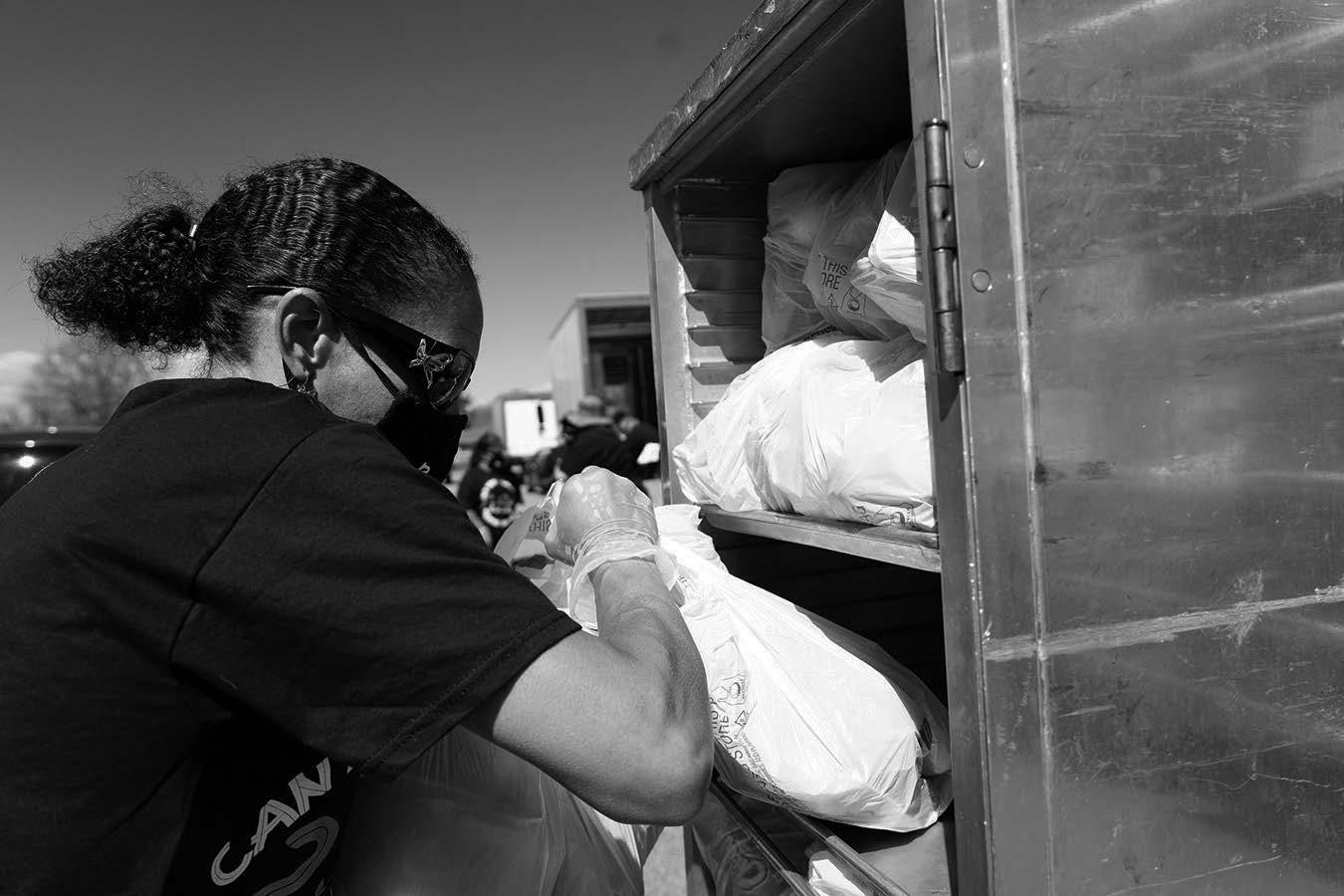






Read between the lines
4) Executing 5) Rodeo tool
6) Imitated at a zoo?
7) "Goldberg Variations" composer 8) Softly hit single 9) Producer of magazines or credit cards
10) Run away
11) Activity performed on a dude ranch
12) It could cause a death on the Nile
13) "_ will be done"
21) Namely
22) Place that exists to pamper
26) Not just this one or that one
27) "Meet Me _ Louis" (1944 film)
30) Before, long before now
31) Arctic floating chunk
32) What a seller seeks
34) Shadow, in a whodunit
35) Common houseplant
36) French door part
38) Boss of a first lieut.
39) What one definitely isn't
40) Intellectually
41) Make it a new game
42) Emulating a newborn
46) In-flight info, for short
47) Not just dinged
49) Obeying a curfew
50) Kind of pig
51) Add supplementary material to
54) "O come let us_ Him"
56) Noted fur trader John Jacob
58) _ carotene
59) Item of Creole cookery
60) " and_















hospital, where he later died from injuries sustained during the crash. Colfax was closed for about two hours during an investigation.
The death marks the 37th traffic-related fatality in 2024.
— Sentinel Staff
Aurora Man shot in the abdomen as he struggled with his neighbor over a gun
An argument Oct. 5 between two men outside their neighboring homes in north Aurora turned violent as they both struggled over a gun before it went off, wounding one of the men.
The two unidentified men live on the 3100 block of Revere Street and “got into a verbal fight outside of their homes” about 6 p.m., police spokesperson agent Matt Longshore said in a statement. “The fight turned physical, and one of the men produced a gun.”
The two men were struggling over the gun when it went off, shooting one of the men in the abdomen.
“That man was taken to the hospital with serious injuries.” Longshore said. “The shooter is currently detained.”
Investigators are determining whether either or both of the men will be charged in the shooting.
— Sentinel Staff
Aurora man, 27, faces litany of child-sex assault and exploitation charges
A 27-year-old Aurora man faces charges of child sex assault and a dozen counts of exploitation related to digital images found on electronic devices that had to be unlocked by federal experts, according to Aurora police.
Aurora police arrested Aaron Marshall Mocalkins, 27, Sept. 24, with the assistance of law enforcement officers in Colorado Springs and El Paso County.
Mocalkins has been charged with one count of sexual assault of a child, one count of unlawful sexual contact of a child, 12 counts of sexual exploitation of a child, two counts of invasion of privacy of a child victim for sexual gratification and two counts of internet sexual exploitation of a child. He was also charged with three misdemeanor counts of cruelty to animals.
The investigation began in March 2022 when Aurora’s Internet Crimes Against Children unit was tipped off that Mocalkins had used the social media app Kik to store and share child sexual abuse images.
Aurora investigators obtained a search warrant and seized undetailed electronic devices from Mocalkins.
“Mocalkins refused to cooperate with the investigation and would not provide detectives with access to his devices,” Aurora police spokesperson Joe Moylan said in a statement. “With the assistance of Homeland Security Investigations, detectives were ultimately able to bypass Mocalkins’ passcodes and confirmed he was in possession of thousands of images and videos of child sexual abuse material.”
Aurora police worked with Denver DA investigators, the Colorado Bureau of Investigation and Homeland Security investigators as part of a group-effort tabbed Colorado Cyber Guardian Task Force, which focuses on crimes involving child exploitation and childsex trafficking.
Mocalkins is being held at the Arapahoe County jail in lieu of $100,000 bond. He is scheduled for a preliminary hearing on charges Oct. 17.
— Sentinel Staff

Colorado Housing and Finance Authority (CHFA) understands the importance of growing, supporting, and celebrating stronger communities.
We provide valuable resources to prepare you for the most important investments in your life—your home and your future. We appreciate the opportunity to get to know you.





• Great Burgers
•
•
•
•
•
•
• GreatCheesesteaks
• Great Philly Cheesesteaks
•
• 20 TVs
•
• Watch All NFL & MLB Games
•
• Open Stage Every Thursday
Soda






















PREPS
FOOTBALL
Campbell steps down as coach after 3-2 start with Vista PEAK Prep
The Vista PEAK Prep football team played its conference opener against Mullen Oct. 4 with an interim coach in charge after Mike Campbell stepped down earlier in the week.

Vista PEAK Prep athletic director David Benedict confirmed to the Sentinel that Campbell resigned Oct. 1 due to “family and personal” reasons.
Jalin McKinnon served as head coach for the game for the Bison, who were off to a 3-2 start in the first season under Campbell. Vista PEAK Prep fell to Mullen 41-20 in a 5A Front Range South contest at Aurora Public Schools Stadium.
“We have coaches who are committed to seeing the kids through the end of the season,” Benedict said in a statement. “At that time, I will sit down with admin, players and parents to start the process of hiring our new coach.”
The next hire made by the school will be the fifth all-time head coach following Campbell — who guided the Bison to wins against Overland (15-13), Lakewood (49-0) and Denver South (35-20) — DeVaughn Thornton Sr. (2021-2023), John Sullivan (20152020) and Pat Rock (2011-2014).
Campbell got the Vista PEAK Prep job in February following a six-season stint at Class 2A Englewood, which followed his 15-year run in 5A with Arapahoe.
Vista PEAK Prep was one of only three Aurora football teams with winning records through five weeks along with 4-1 Eaglecreset and 3-2 Rangeview.
Aurora teams kick off conference play with 3-8 mark in Week 6
Conference play arrived in Week 6 for Aurora football teams, which finished with a combined 3-8 record.
The start of Centennial League play did not derail Eaglecrest’s hot start, as coach Jesse German’s Raptors moved to 5-1 with a 54-14 victory over Smoky Hill on a scorching day at Stutler Bowl Oct. 5. Eaglecrest quarterback Joe Steiner had a massive game with 268 yards passing and five touchdown passes, with one apiece going to Burke Withycome, Brayden Black, Ryan Perez, Clyde Surrell IV and Jack Steiner. Trent Littlejohn rushed for 152 yards and a touchdown and Flynn Latta also scored for coach Brandon Alconcel’s Buffaloes (0-5, 0-1).
Regis Jesuit upped its winning streak to three games in style with a 40-0 Southern League victory over Chaparral Oct. 5 at sundrenched Echo Park Stadium. Coach Danny Filleman’s Raiders (33, 1-0) got a passing and rushing touchdown from quarterback Luke Rubley, while Joe Pron and Benjamin Bacon got into the end zone on the ground. Cade Filleman hauled in Rubley’s TD pass, while Jack Manthey knocked through a 37-yard field goal to end the first half and made all five of his extra points.
Overland snapped a four-game losing streak with a 34-7 victory against Mountain Range Oct. 4 at Stutler Bowl in a 5A Metro North League opener. Coach Tony


Lindsay Sr.’s Trailblazers (2-4, 1-0) got a big play from Mike Kelly — who returned a kickoff for a touchdown —while Angel Chavez, Jarrius Ward, Zyaire Custis and Kylan Jones all rushed for scores.
Vista PEAK Prep — guided by interim head coach Jalin McKinnon after Mike Campbell stepped down — fell back to .500 with a 41-20 loss to Mullen Oct. 4 at Aurora Public Schools Stadium. The Bison dropped their 5A Front Range League South opener, as did Rangeview, which lost 49-6 on the road at run-heavy Erie. Coach Chris Dixon’s Raiders are 3-3. Grandview’s two-game winning streak came to an end Oct. 4 at Legacy Stadium, as coach Tom Doherty’s Wolves dropped a 25-13 Centennial League opener to Arapahoe. Caleb Llamas rushed for a touchdown on the first offensive play of the second half for Grandview (2-4, 0-1) and finished with 117 yards on the ground, while Will Reid knocked through two field goal attempts.
Also 2-4 is Aurora Central, which took a fourth-quarter lead over Montbello Oct. 3 at APS Stadium before it fell 30-18. Coach Chris Kelly’s Trojans (2-4, 0-1 in 4A Denver Metro League) got a touchdown run from Ladarious Willingham in the fourth quarter to take a lead, but allowed the subsequent kickoff to be returned for a score and could not catch up.
Yet another 2-4 program is Cherokee Trail, which took part in the Cherry Creek School District’s Military Appreciation event with its game against Cherry Creek Oct. 4. Tyson Smith threw for 181 yards — 111 to Brian Cusack — but coach Justin Jajczyk’s Cougars were held scoreless for the second time.
Gateway traveled to the Western Slope for a matchup with Grand Junc-
tion at Stocker Stadium Oct. 4 in 4A I-25 League play. Coach Rashad Mason’s Olys (1-5, 0-1) got a touchdown pass from Westin Rayburn to Jeramaiah Stark plus a Michael Washington rushing score. Coach Dennis York’s Hinkley (0-5) team finished up non-league play with a 44-0 home loss to Kent Denver Oct. 5.
WEEK PAST
The week past in Aurora prep sports
SATURDAY, OCT. 5: The Cherokee Trail softball team moved into the championship game of the Centennial League Challenge with a 12-7 home victory over Arapahoe. Sydney Cobb earned the win on the mound, while she also homered and drove in four runs, while Delaney Falzon also went deep and Kylie Twilt had three hits. ...
The Grandview softball team prevailed over Eaglecrest 5-3 in a championship semifinal contest of the Centennial League Challenge behind Kamaya Soniea-Harris, who struck out 10 in a complete game. Sasha Kennedy stole four bases and went 3-for-4, Maddie Donaldson had three hits and Maddie Henrich doubled and drove in three runs for the Wolves. Kaitlyn Hendrian homered and drove in two runs and Callie Johnson had a RBI as well for the Raptors. ... Trea Robinson and Ellen Paris drove in runs for the Smoky Hill softball team in a 16-4 loss to Cherry Creek in a Centennial League Challenge consolation semifinal. ...The Regis Jesuit boys cross country team finished third out of 28 teams in the Mead Stampede, while Smoky Hill placed eighth. Caleb Aex and Mason Saum finished eighth and 11th, respectively, for the

LEFT: Eaglecrest’s Jack Steiner, right, gets past a Smoky Hill defender and tracks a ball he caught for a touchdown pass during the Raptors’ 54-14 win Oct. 5. ABOVE: Aurora Central’s Ladarious Willingham (11) leaps in the air after he scored a late touchdown in the Trojans’ 30-18 loss to Montbello Oct. 3. BELOW LEFT: Regis Jesuit’s Benjamin Bacon (28) crosses over the middle of the field as he is swarmed by Chaparral defenders during the Raiders’ 40-0 win Oct. 5 at EchoPark Stadium. BELOW RIGHT: Overland’s Avante Hendrix (2) sheds a Mountain Range defender after bringing in a catch during the Trailblazers’ 34-7 win Oct. 4 at Stutler Bowl. (PHOTOS BY COURTNEY

Raiders to lead locals. The Regis Jesuit girls (led by Zoe Small’s 34th-place finish) came in 10th and Smoky Hill (paced by Mackenzie Panek in 36th) took 18th. ...The Rangeview girls flag football team swept two contests with an 18-8 victory over George Washington plus a 12-6 win over Thomas Jefferson. Brooke Sullivan threw two touchdown passes (one to McKenzie Rigsby) and also rushed for one as the Grandview girls flag football team topped Smoky Hill 33-0. ...The Overland girls flag football team picked up a 13-6 win over Cherokee Trail with help from Sahniya Vaughn (85 yards passing, 98 yards rushing and two touchdowns), plus Joy Jamison’s receiving touchdown. ...Natalie Chilton scored a goal in the fourth quarter to put the Regis Jesuit field hockey team ahead of Cherry Creek, but the Bruins answered with two goals to defeat the Raiders 2-1. ...The Overland gymnastics team scored 179.550 points to place second behind Mountain Range among 11 scoring teams at the Mountain Range Invitational. Ainsley Renner’s 36.850 put her third in the all-around. ...FRIDAY, OCT. 4: The Regis Jesuit softball team piled up 17 runs in the fourth inning on its way to a 21-7 road win at Vista PEAK Prep Kendalyn Craven homered and drove in five runs, while Claire Pariset and Elsa Pedersen knocked in three apiece to back winning pitcher Alex Tavlarides for the Raiders, while Nayely Duran homered and drove in three runs and Kaydence Maes had two RBI. ...The Cherokee Trail boys cross country team finished 15th, Rangeview placed 16th and Vista PEAK Prep 27th among 38 teams at the Pat Amato Classic at Open Spaces Park. Rangeview’s Abdinasir Hassan finished 20th (out of 269
runners) to lead locals. The Cherokee Trail girls (who had the top individual finisher in Jade McDaniel in 29th) finished ninth with Rangeview 31st and Vista PEAK Prep 33rd. ...Sahniya Vaughn and Joy Jamison accounted for two touchdowns and interception apiece as the Overland girls flag football team topped Mountain Range 2520. ...Delaney Sitzmann threw touchdown passes to Ava Keen and Finley Kalmes in the first half, but the Regis Jesuit girls flag football team fell to Rock Canyon 21-19. ...THURSDAY, OCT. 3: Sophia Capra racked up 11 kills and Madelyn Hannam added 10, while Lucy Tricco made 17 digs and had 22 assist as the Regis Jesuit girls volleyball team swept Ponderosa 2519, 25-21, 25-20. ...Jack De Simone scored a goal and collected two assists as the Regis Jesuit boys soccer team topped Highlands Ranch 3-1. Sebastian Campos and Rocco Berg also had goals. ...The Vista PEAK Prep boys soccer team blanked Denver South 3-0 in City League play behind two goal and an assist from Angel Flores, while Cristian Rosas also had a goal. ...The Aurora Central boys soccer team scored two goals in both halves of a 4-1 home win over Thornton. ...Emma Rice threw five innings of two-hit ball to lead the Cherokee Trail softball team to a 10-0 home win over Chaparral. Kennedy Brian and Izzy Becker both went 3-for3, while Sydney Cobb and Icela Ciocarlan had two hits apiece, including a homer. ...The Vista PEAK Prep softball team scored multiple runs in five of its six at-bats in a 13-2 City League road win at Thomas Jefferson. Amara Herrera had three hits and scored three times, Jaya Gray had an inside-the-
park homer and scored four runs and Rylie Camarillo picked up three RBI to back Lauren Reed, who gave up two uneearned runs in four innings. ...The Overland softball team downed visiting Denver West 20-14 with help of four stolen bases and four rusn from Anaiah Patterson, plus two RBI from Kourtnie Batcho WEDNESDAY, OCT. 2: The William Smith boys soccer team posted a 4-1 win over STEM School. Sybella Trevino had a grand slam in the top of the 10th inning and drove in five runs as the Eaglecrest softball team edged Arapahoe 8-7 in a Centennial League Challenge first round game resumed from the previous day. Zaya Elliott threw all 10 innings to earn the win for the Raptors, who also got a home run from Kaitlyn Hendrian and three htis from Callie Johnson. ...The Cherokee Trail softball team had its 13-game winning streak snapped with an 8-2 loss to Legend. Emma Rice homered and joined Delaney Falzon with RBI for the Cougars. ...Maci Quiring threw two touchdown passes to Naomi Emecheta, who also rushed for one while Bailyee Hervey and Leila Medeiros also scored in the Eaglecrest girls flag football team’s 30-0 win over Cherokee Trail. ...The Grandview and Regis Jesuit boys tennis teams each posted victories to open the Class 5A state team tournament as the Wolves topped Fort Collins 5-2 and the Raiders swept Northfield 7-0. ...Casey Nesbitt shot 92 and Jesse Olson carded a 96 to lead the Vista PEAK Prep boys golf team to a 10th-place finish at the Class 5A Southern Region tournament at Columbine C.C. ...TUESDAY, OCT. 1: The Cherokee Trail girls volleyball team got nine kills apiece from Kassie Cooley, Quincey McCoy and Ella Notheisen, plus 27 assists from Avery Krause, in a 25-20, 25-15, 25-23 Centennial League sweep of Arapahoe.


Maddie Killmer crushed 13 kills, had 13 assistss and seven service aces to help the Rangeview girls volleyball team to a 25-11, 25-22, 25-10 City League home sweep of Denver North. Anika Davison added eight kills and 12 digs, while Teyla Holloway had 17 assists. ...Fueled by 14 kills from Jada Bobb plus 10 more from Emily Jarzebczyk, the Eaglecrest girls volleyball team rallied for a 22-25, 25-15, 25-25, 25-21 Centennial League victory. ...Sajal Glunz had 11 kills, while Julia Ulitzky had 30 assists and four service aces for the Grandview girls volleyball team in a 25-12, 25-21, 25-15 win over Overland. Andrew Harwell scored goals in each half and Jacob Winnig also tallied for the Grandview boys soccer team which claimed the Arapahoe Derby trophy with a 3-2 win over Cherokee Trail Caleb Burgess and Vincent
Tchoumba scored goals in the second half for the Cougars. ...Hugh Brophy, Jack De Simone and Reed Garcia were the goal scorers for the Regis Jesuit boys soccer team in a 3-0 win over Rock Canyon. ...The Gateway boys soccer team piled up four goals in the second half of a 5-2 win over Thornton. ...Adam Keresemo scored a goal for the Eaglecrest boys soccer team, while Andreas Karpouzos countered for Smoky Hill as the teams played to a 1-1 tie. ...The Vista PEAK Prep softball team earned an 18-7 City League win at Northfield witih help from three-hit days for Amara Herrera and Jaya Gray, plus Nayely Duran’s home run and four RBI. Sydney Cobb pitched three scoreless innings to help the Cherokee Trail softball team down Cherry Creek 12-3 to open the Centennial League Challenge. Kennedy Brian and Emma Rice


had three hits apiece, while Icela Ciocarlan homered and drove in four runs. Sasha Kennedy went 4-for-4 with eight stolen bases as the Grandview softball team topped Smoky Hill 15-0 in the Centennial League Challenge first round. Maddie Donaldson homered and Monroe Donaldson went 3-for-3 for the Wolves. ...Brooke Sullivan threw for 144 yards and three touchdowns and Kenzie Dodd rushed for three scores as the Grandview girls flag football team topped Overland 46-14. ... Genesis Luevanos threw a touchdown pass to Ana Smith, while Oriah Owens and Laneya Clint-Robinson rushed for scores as the Vista PEAK Prep girls flag football team topped Bruce Randolph 22-20. ...The Cherokee Trail and Grandview boys tennis teams earned sweeps of Douglas County and Legend, respectively,
while Overland defeated Denver North 6-1. ...The Gateway boys golf team’s Cole Dossey and Meryk Wright finished 53rd and 55th, respectively, in the Class 4A Region 2 tournament at The Broadlands G.C. ...MONDAY, SEPT. 30: The Lotus School For Excellence boys soccer team got two goals from Mikiyas Regassa in a 3-0 win over William Smith. ...The Eaglecrest softball team blanked Cherry Creek 10-0 behind a five-inning no-hitter from Zaya Elliott, who struck out eight. Sybella Trevino drove in five runs and joined Callie Johnson with three hits. ...The Grandview girls flag football team scored in each quarter of a 26-6 win over Ralston Valley that saw Brooke Sullivan throw and rush for a touchdown, while Tierra Goodgain and Margad Munkhsaikhan had scores and Sadie Perry intercepted three passes.

